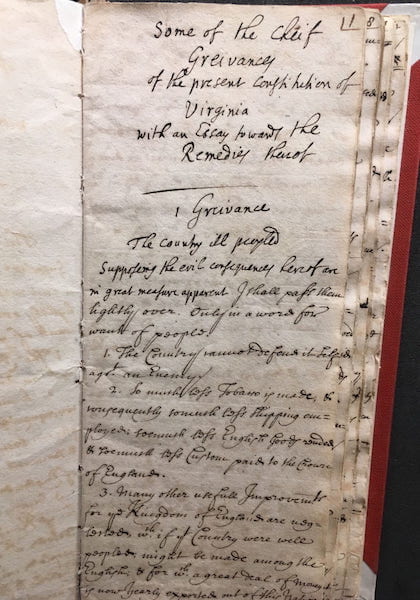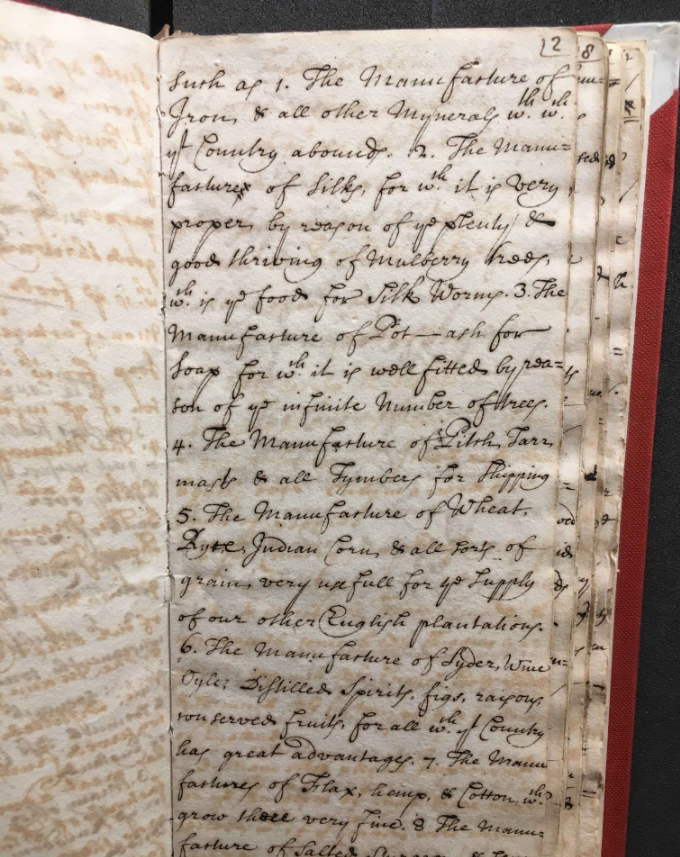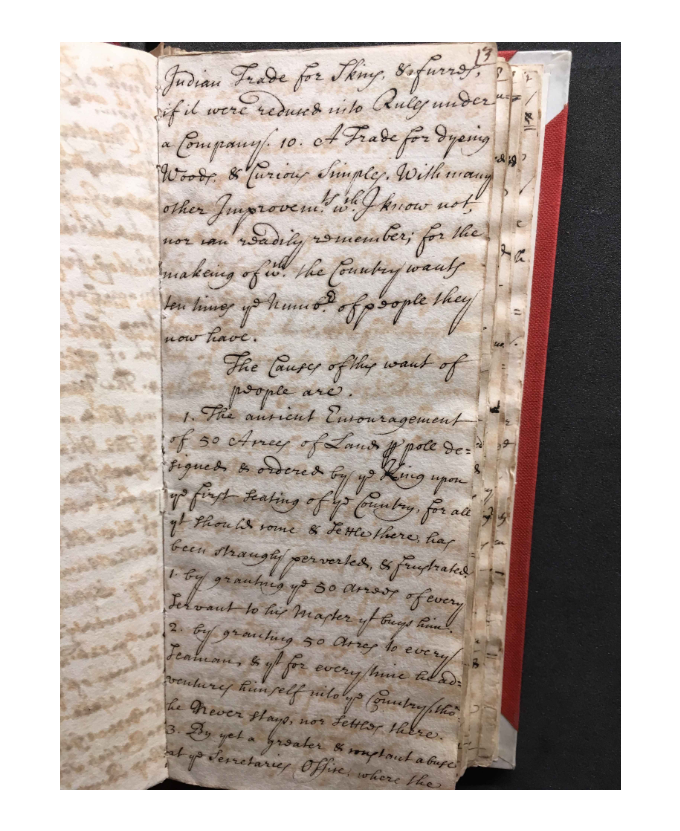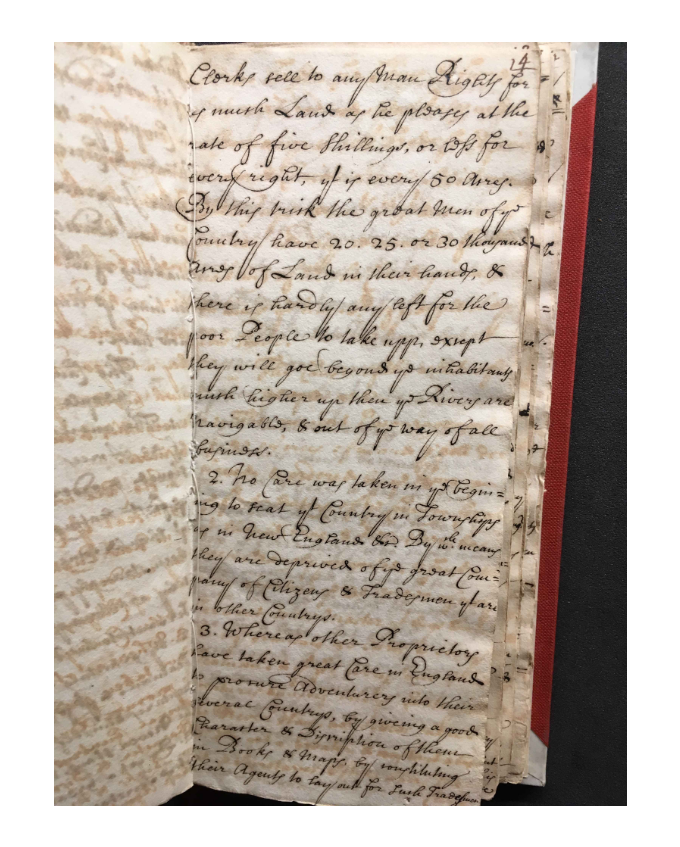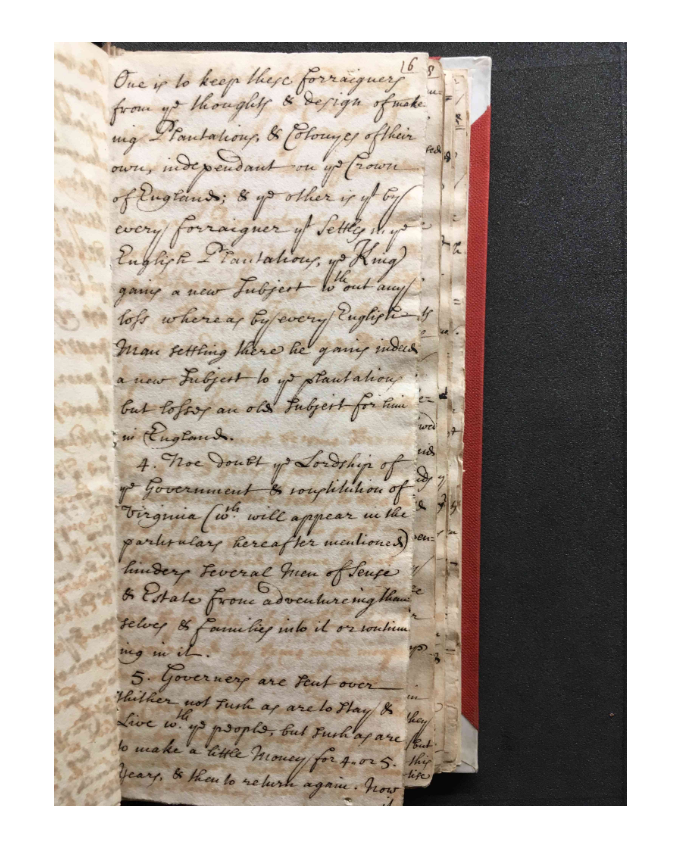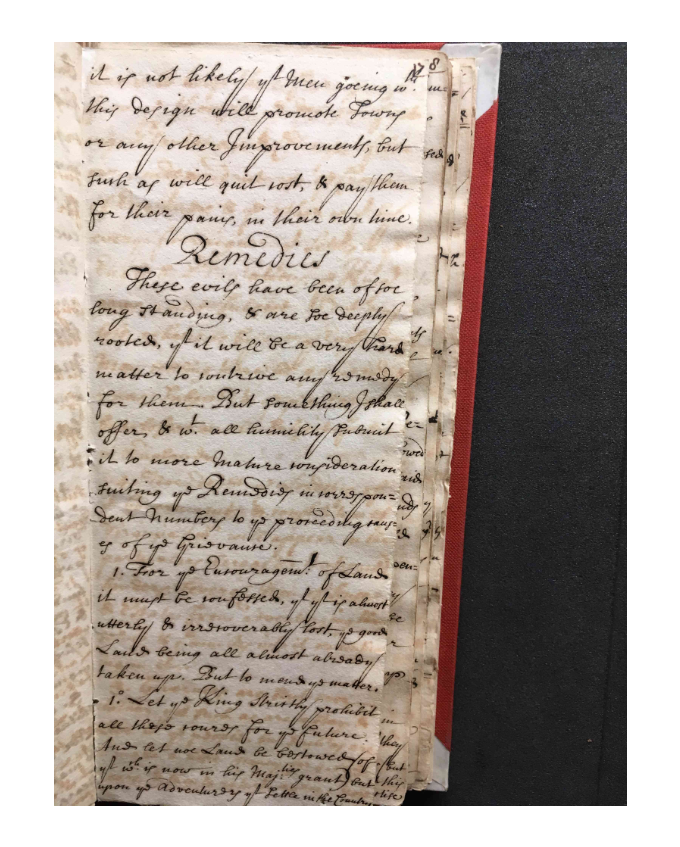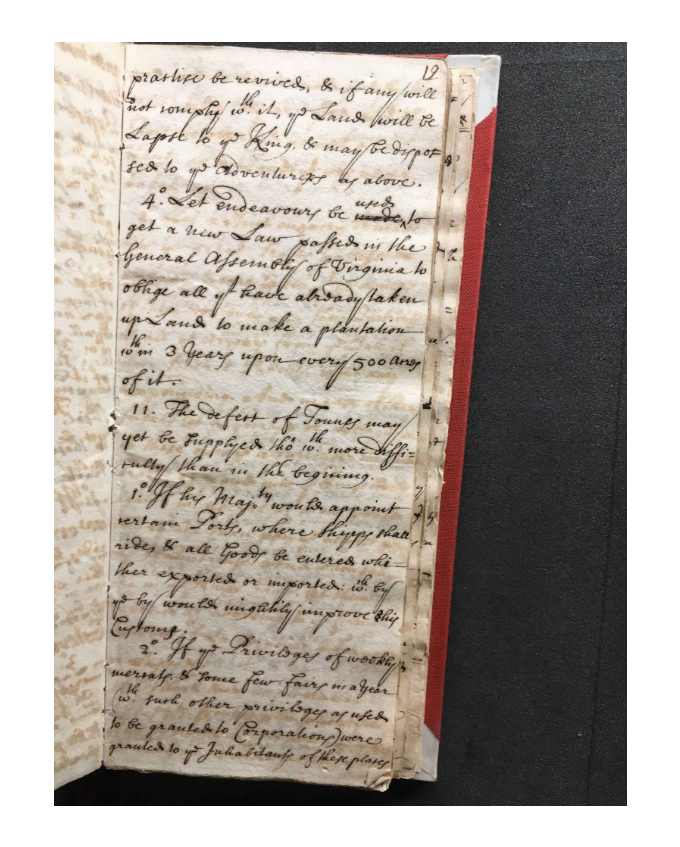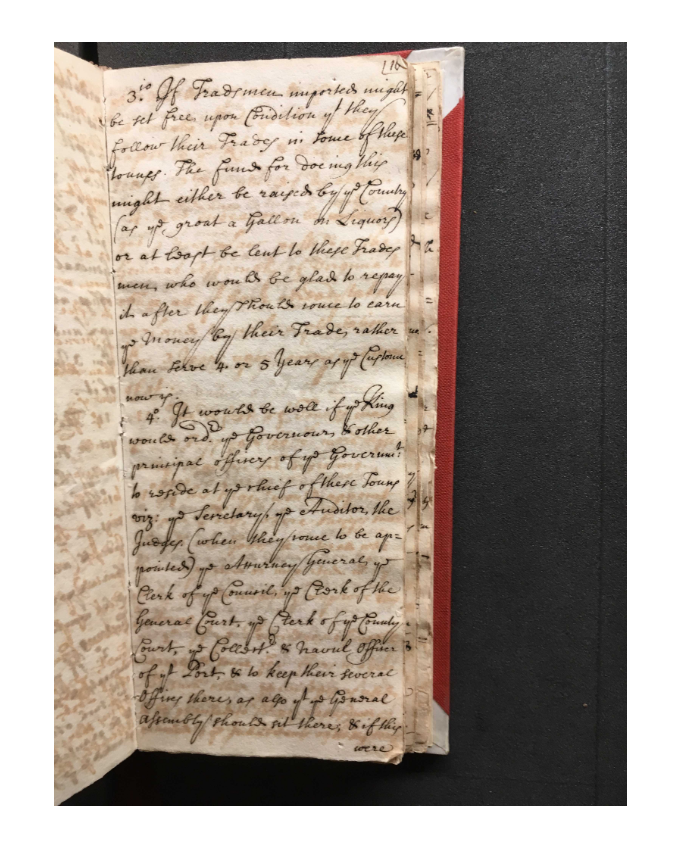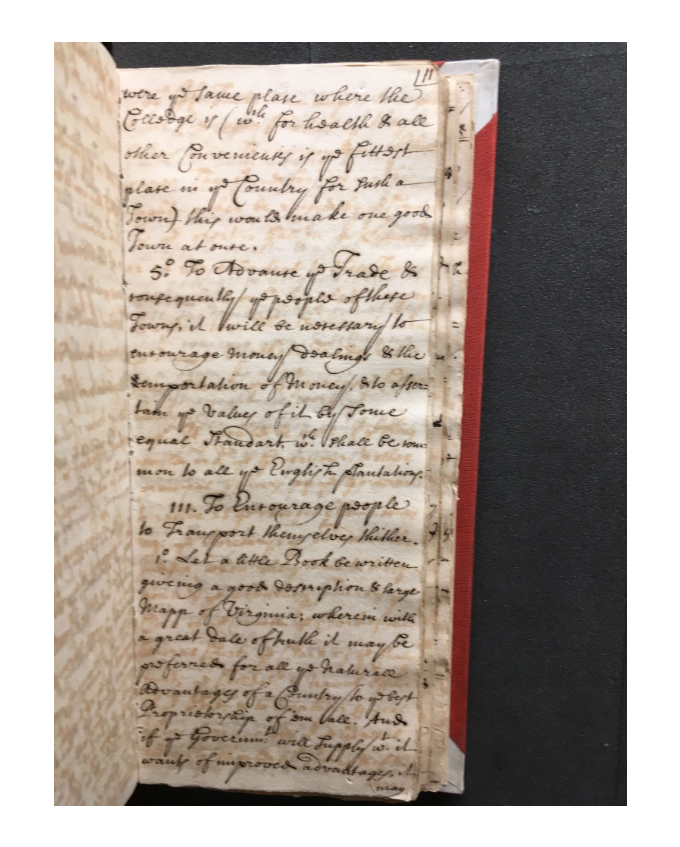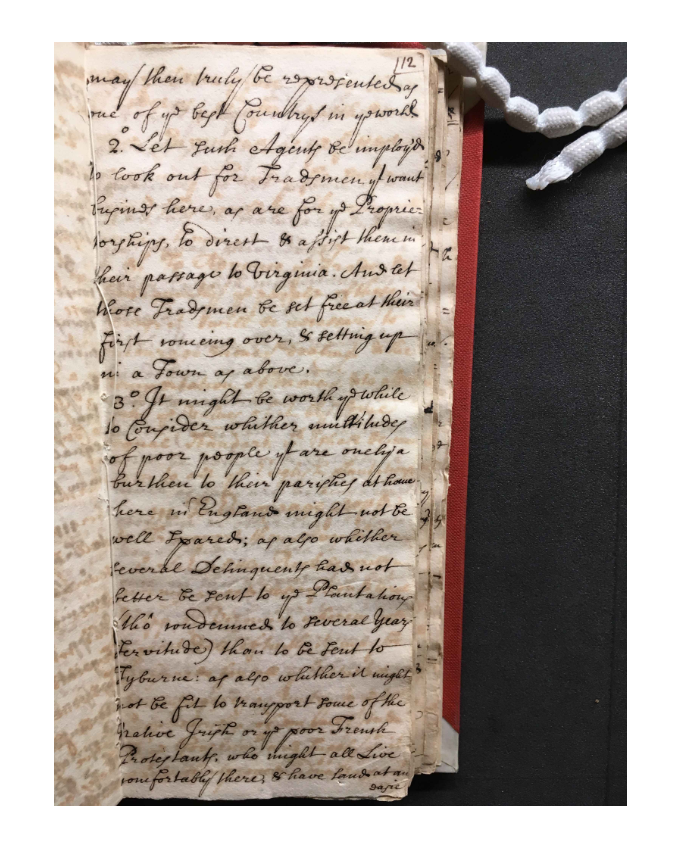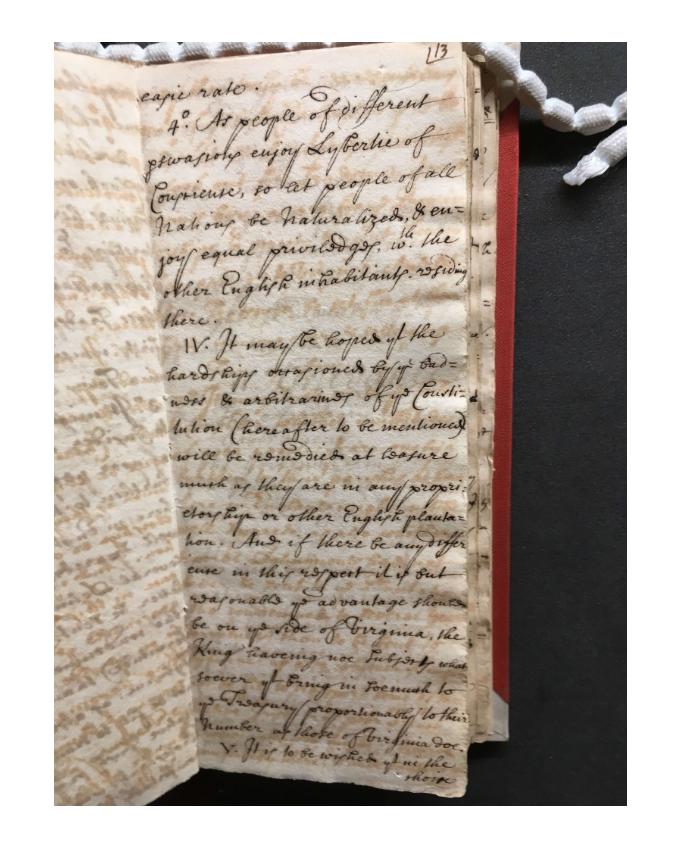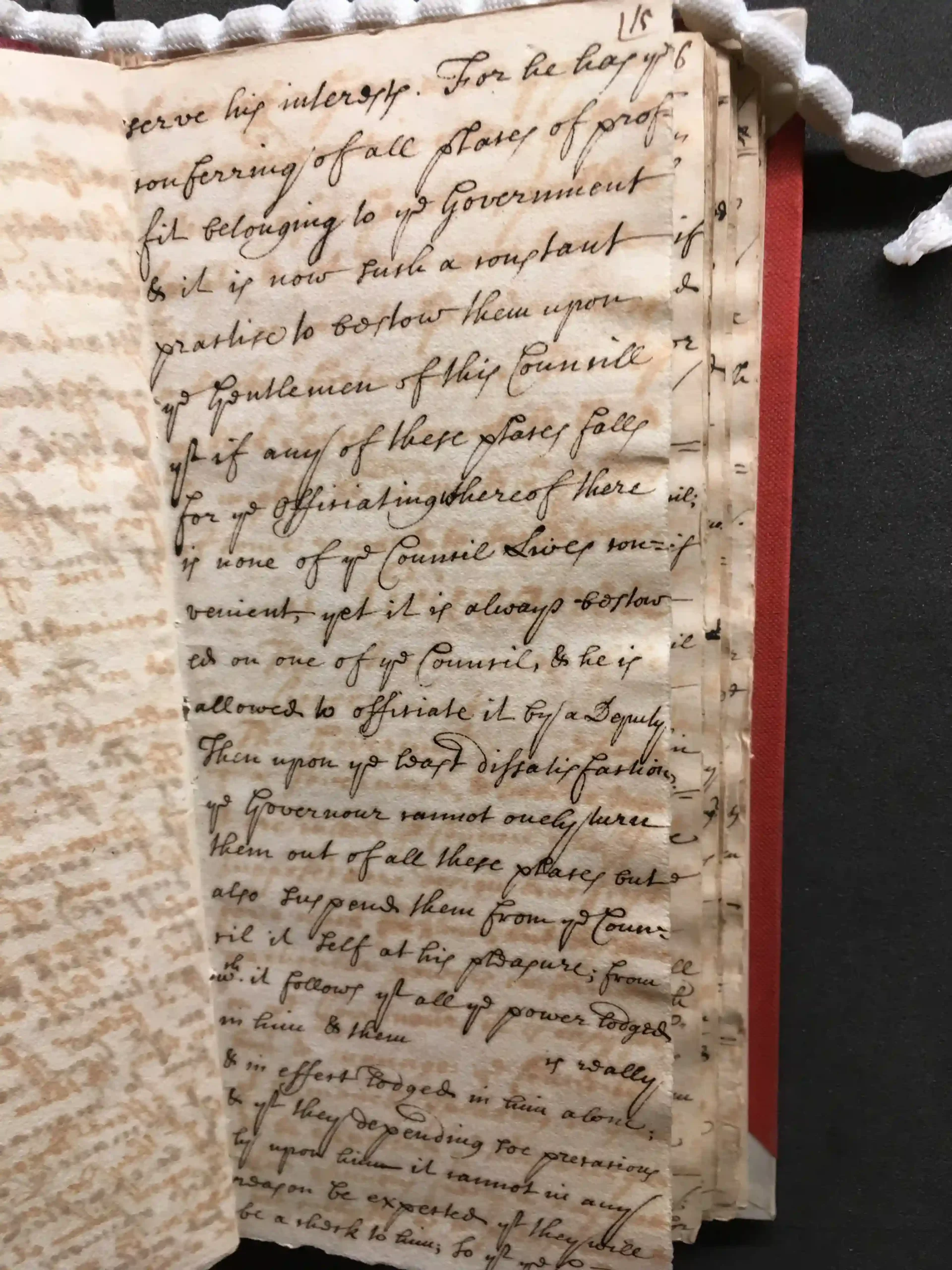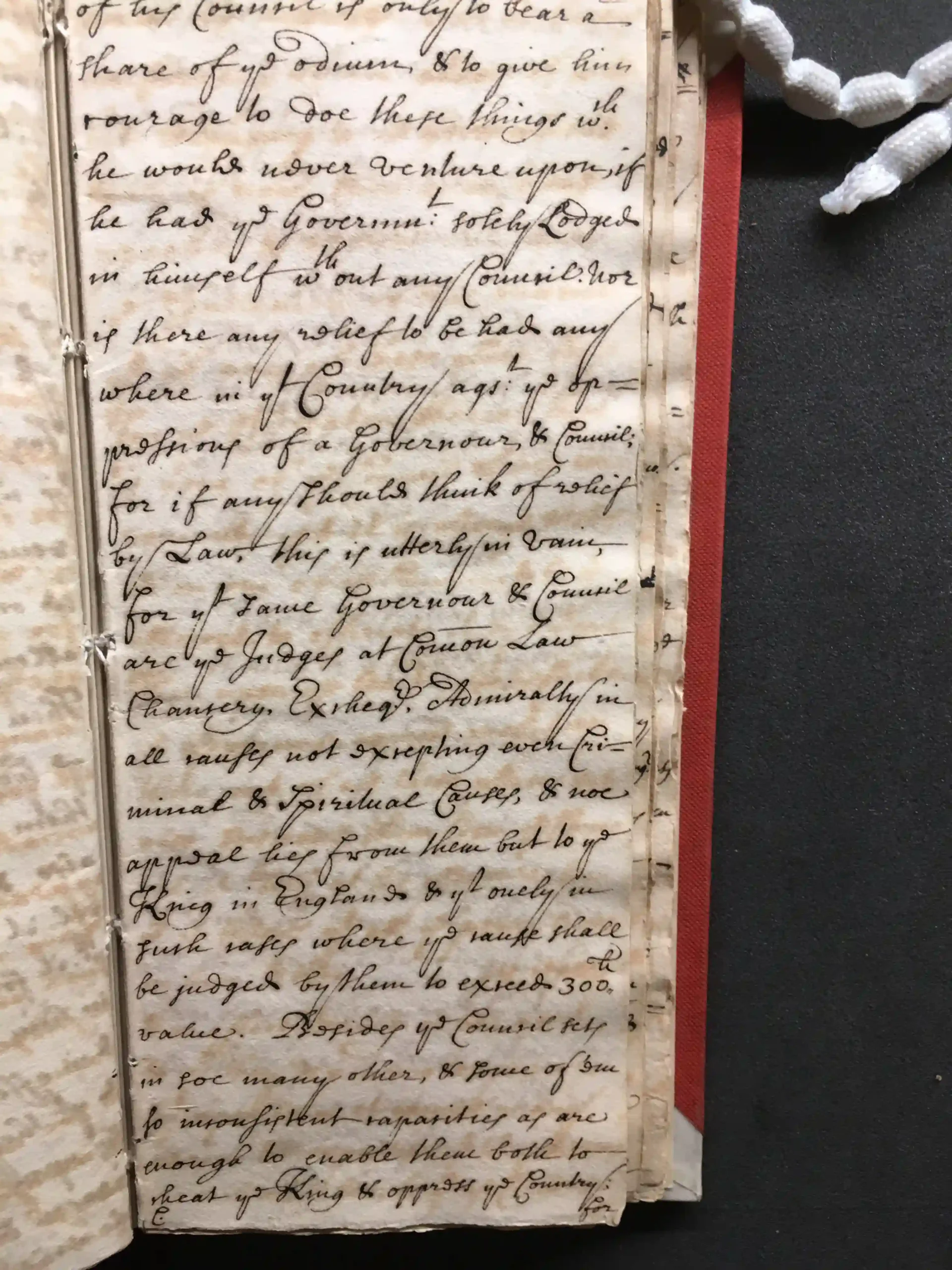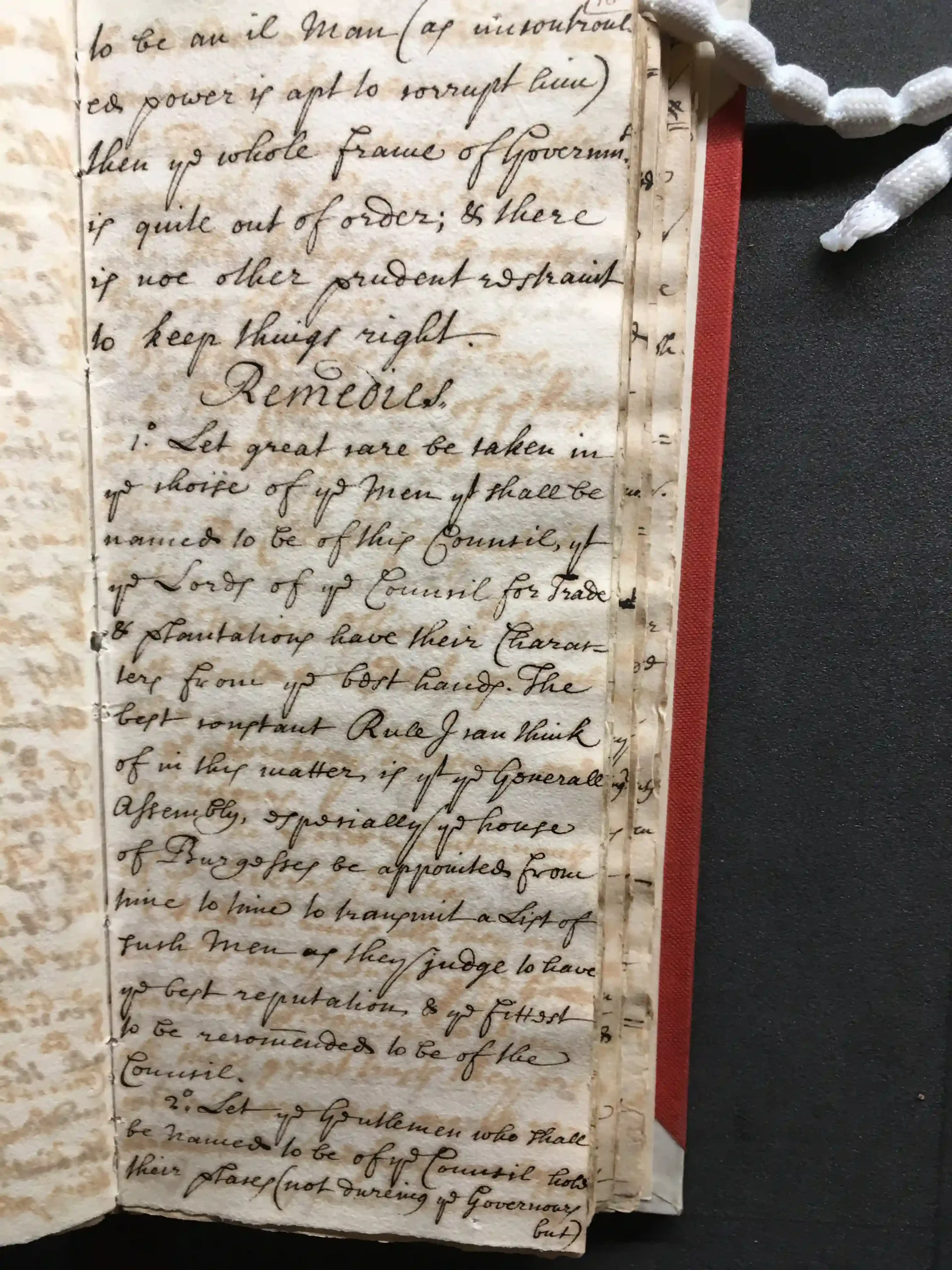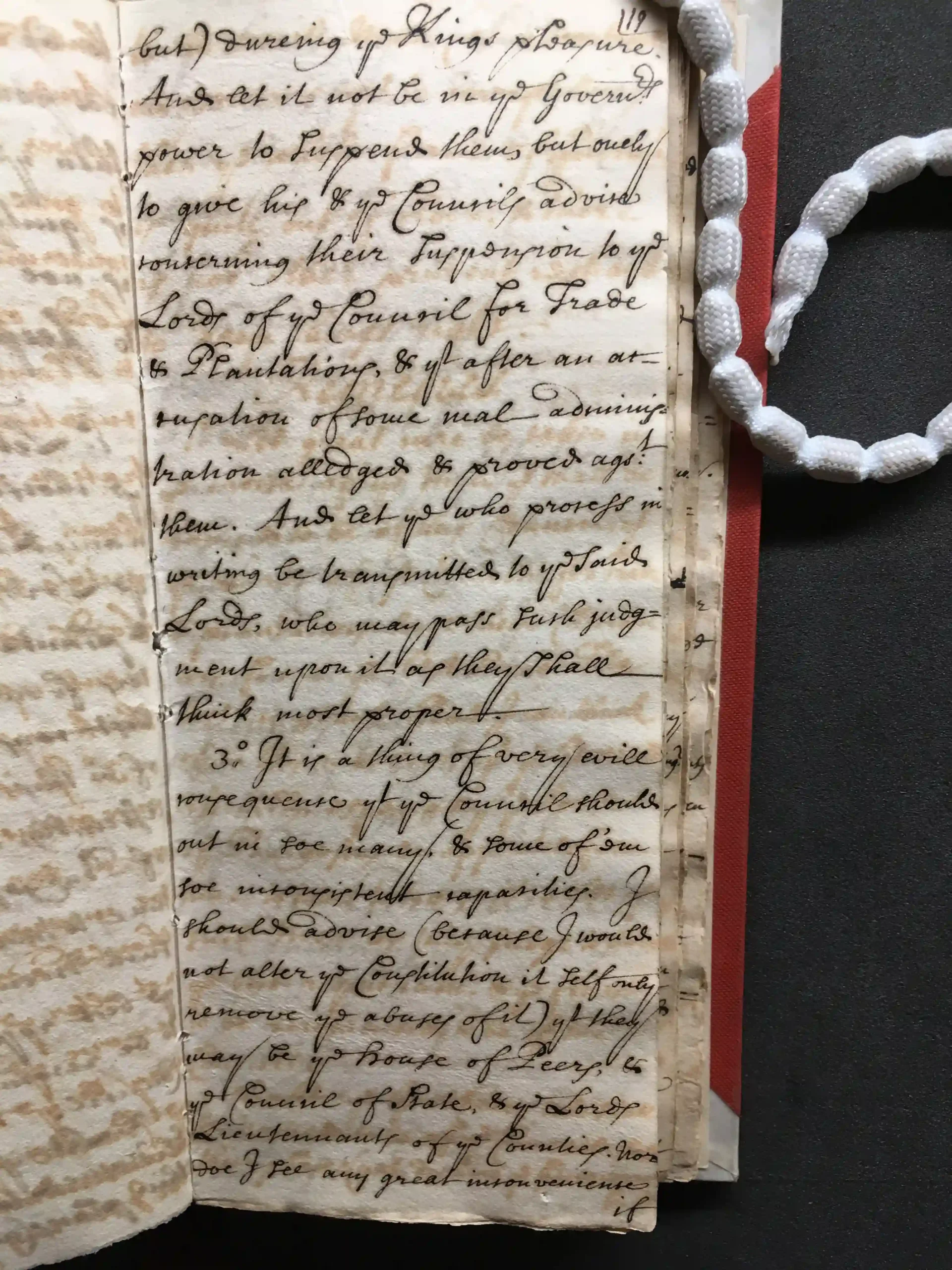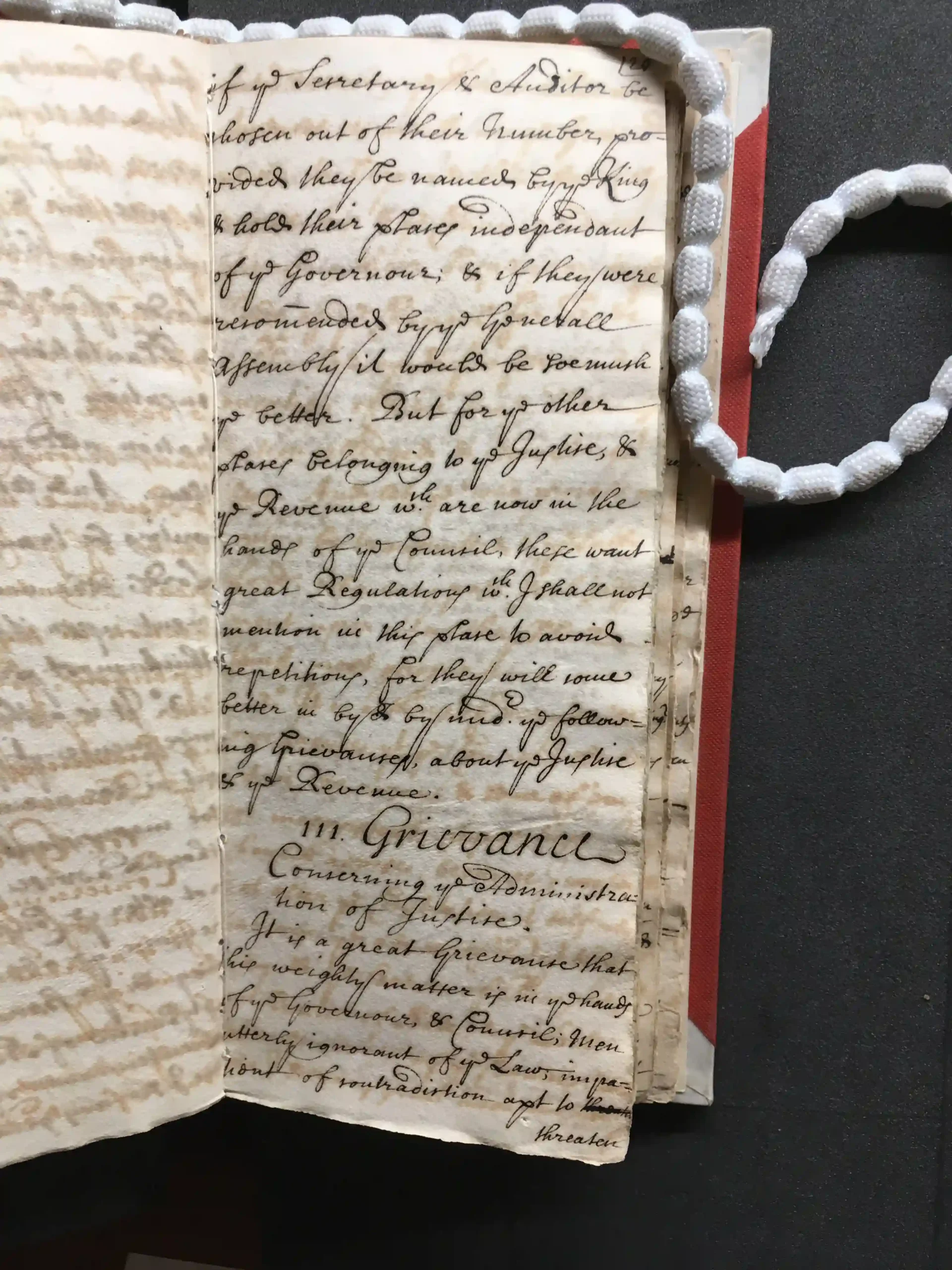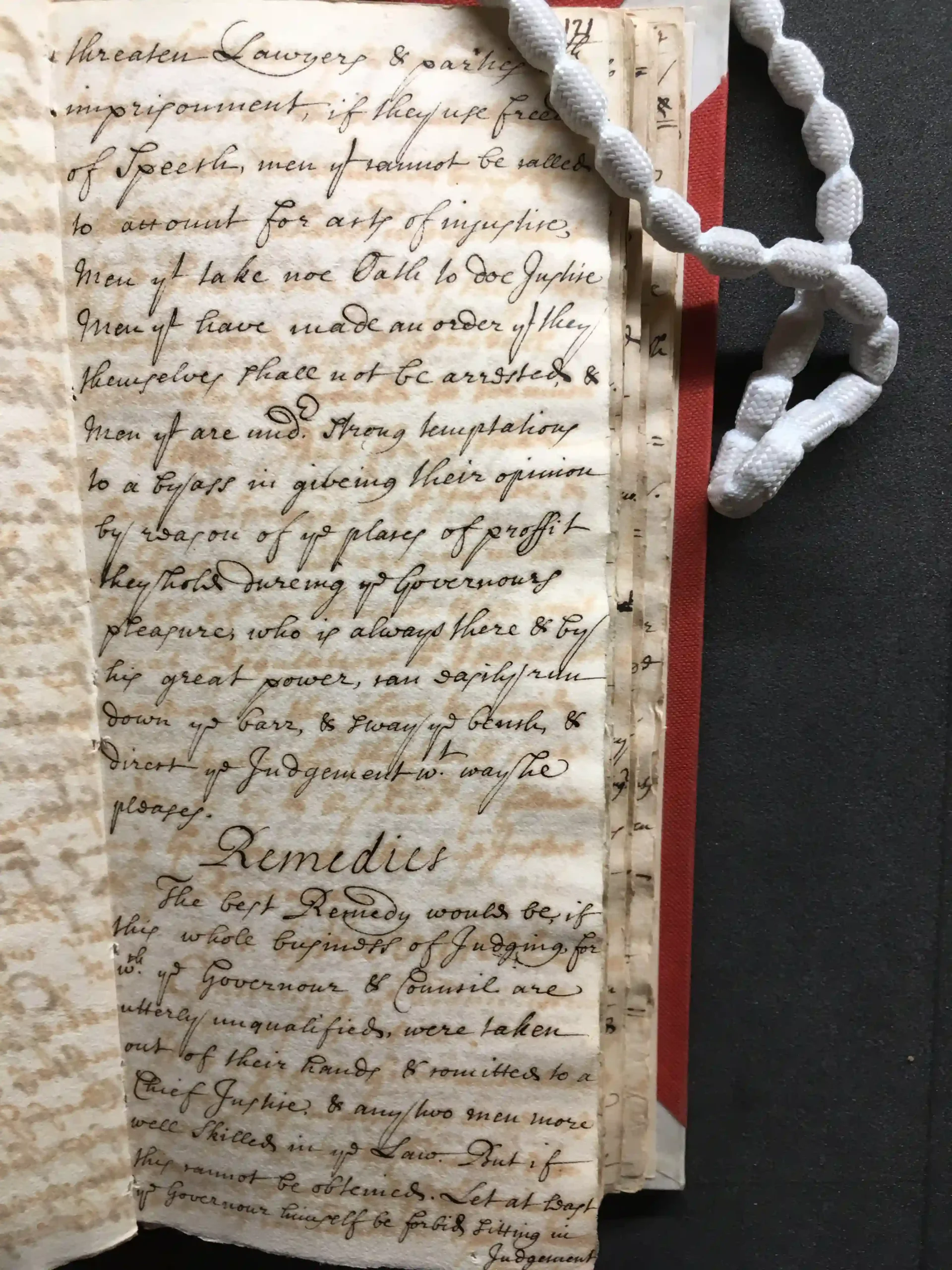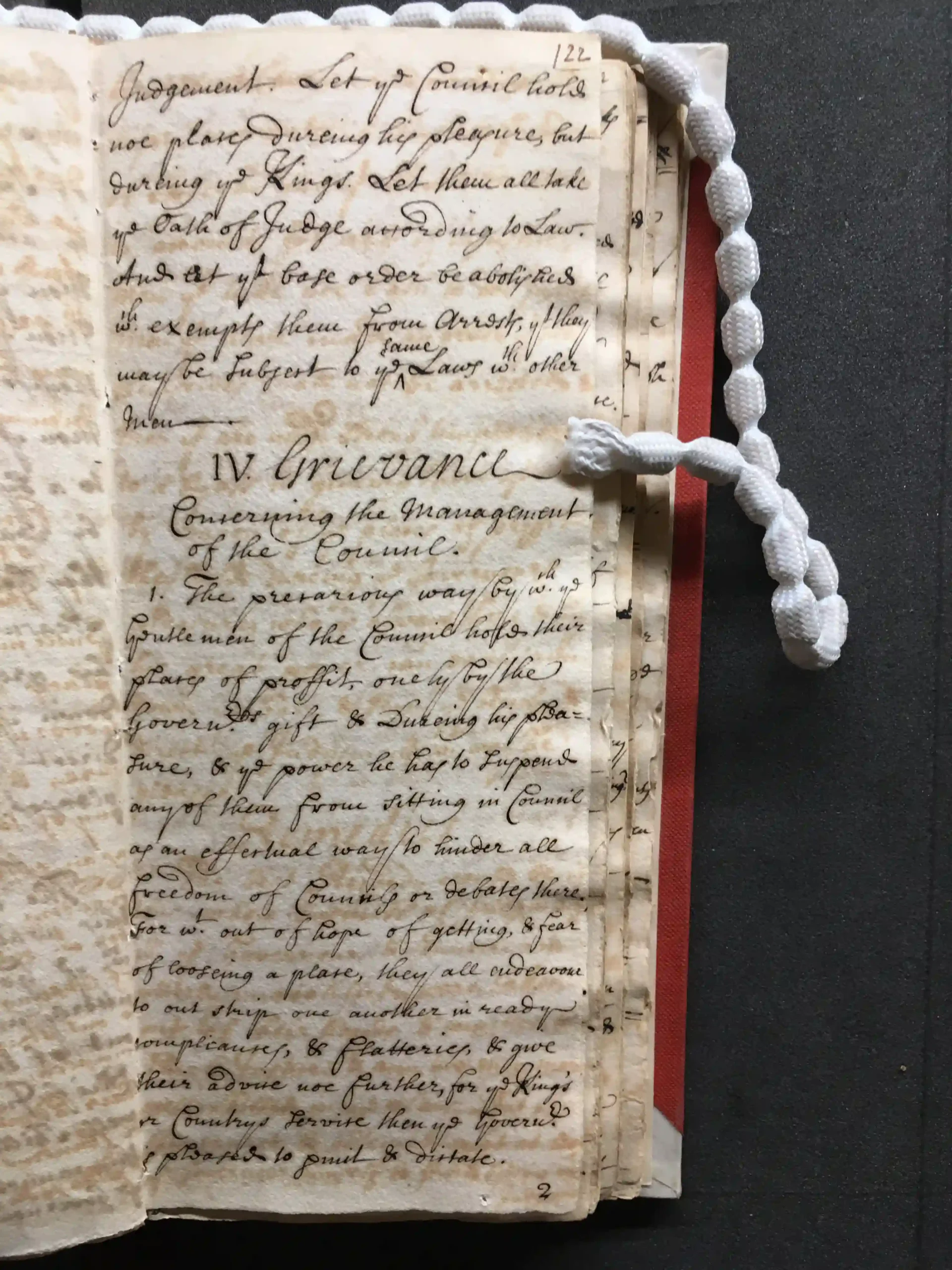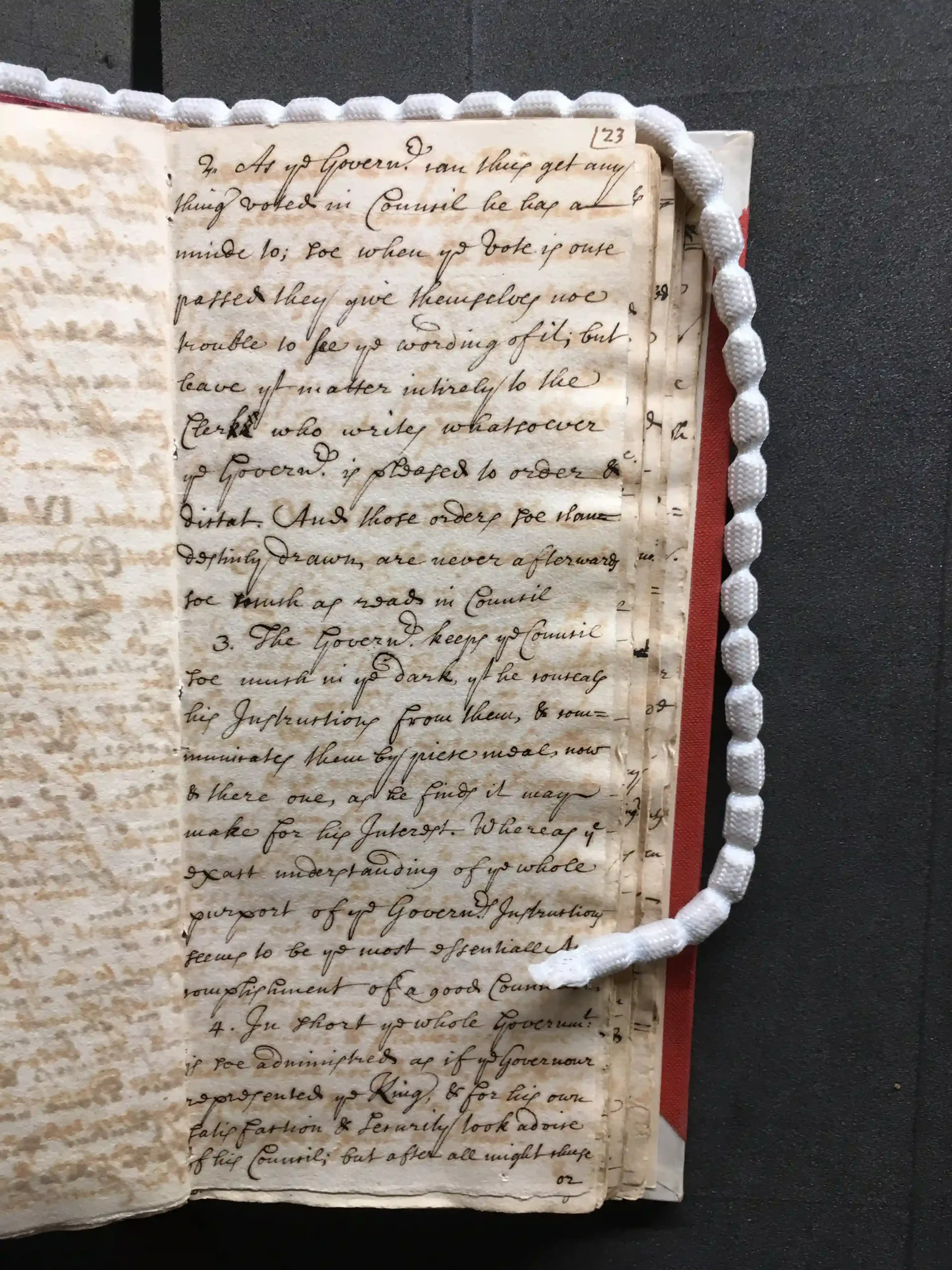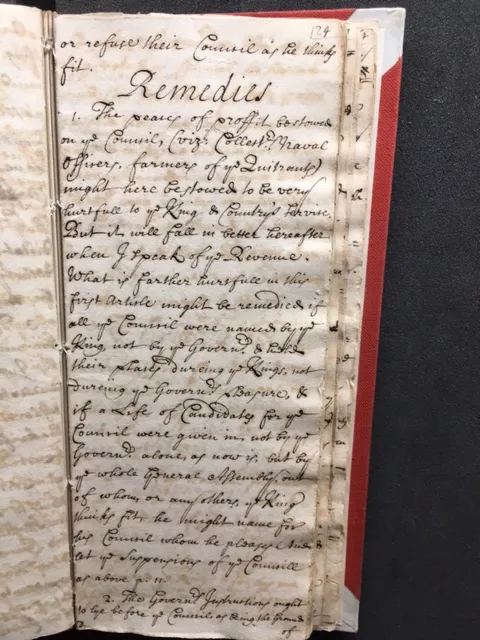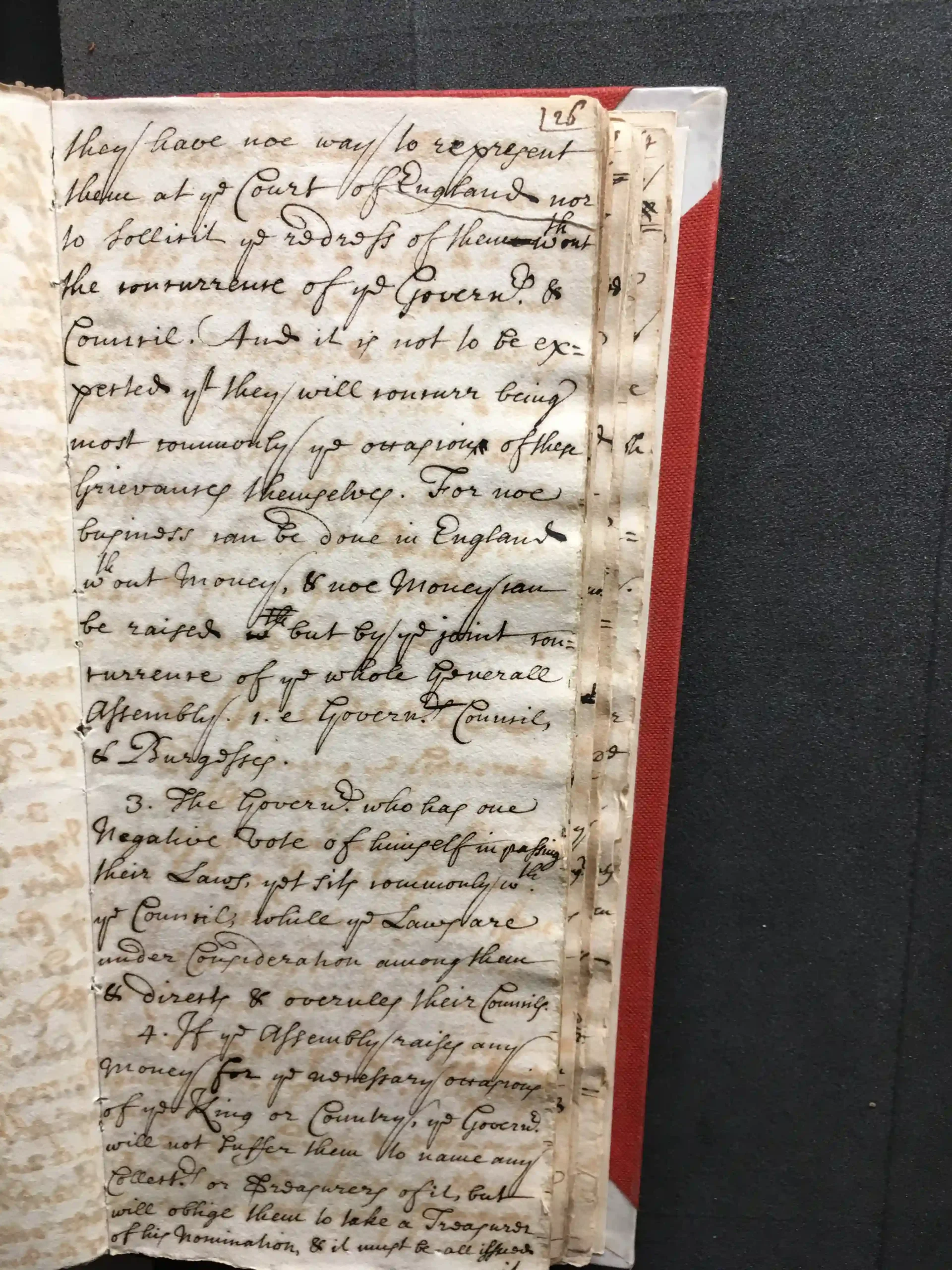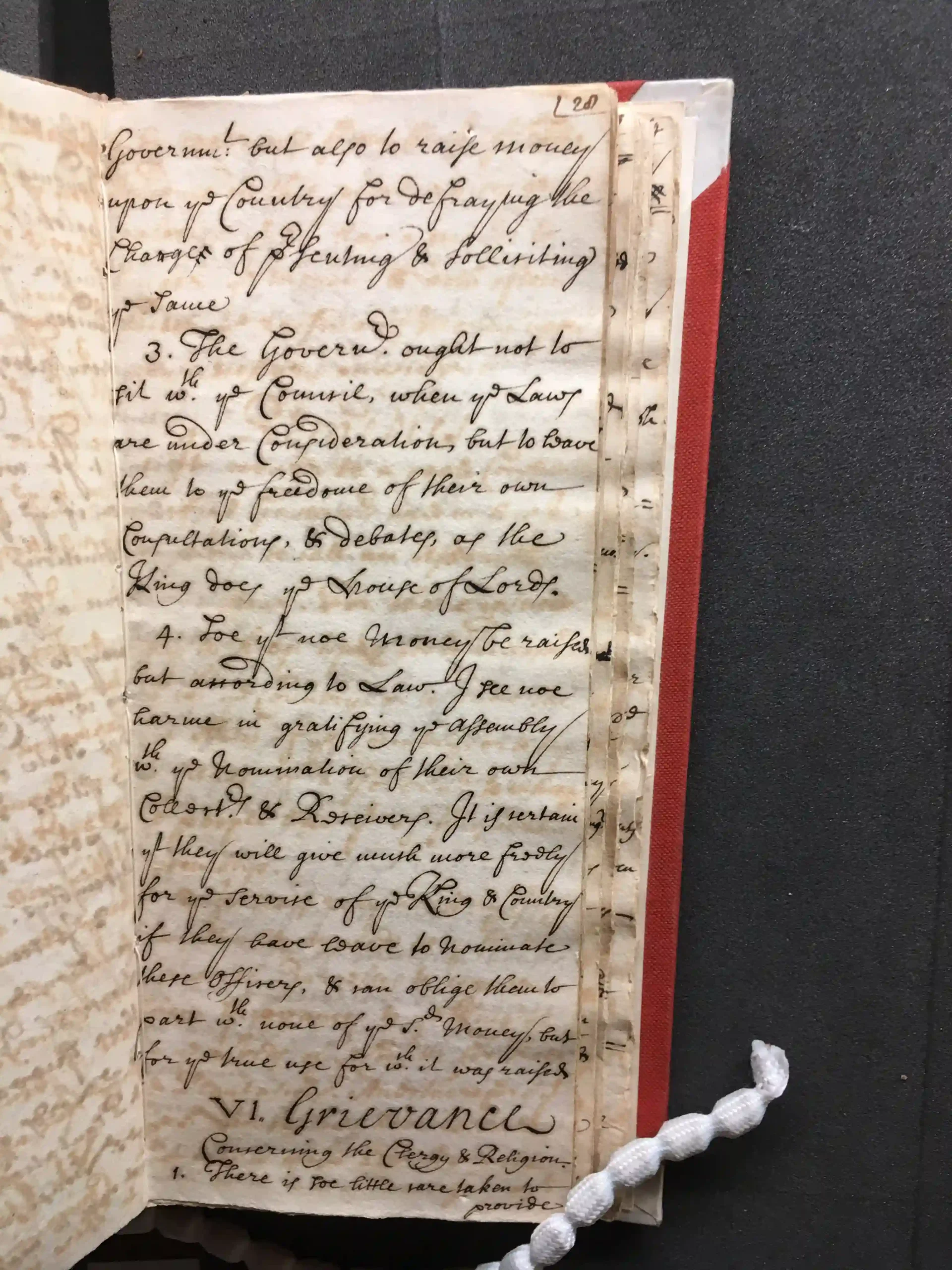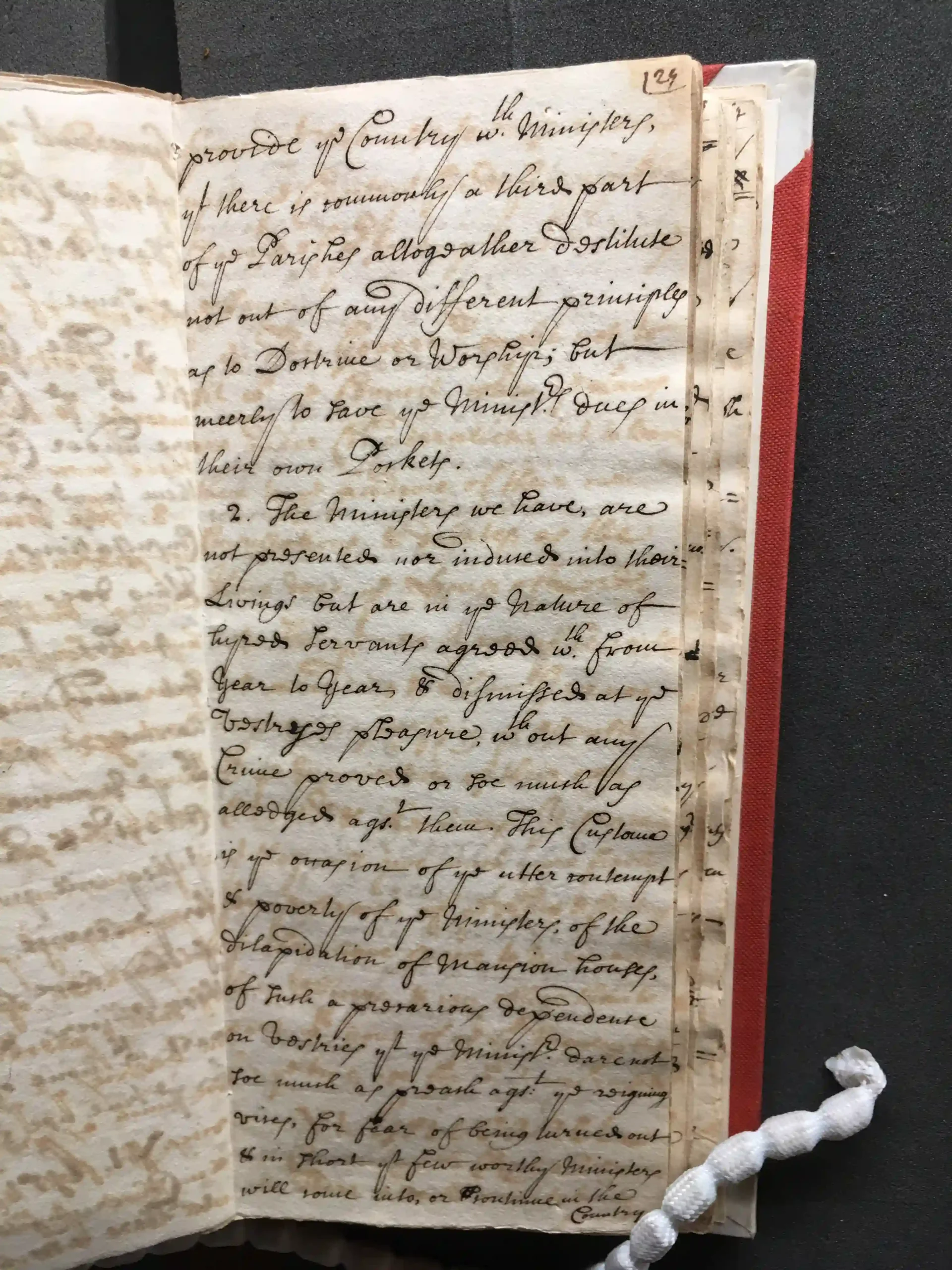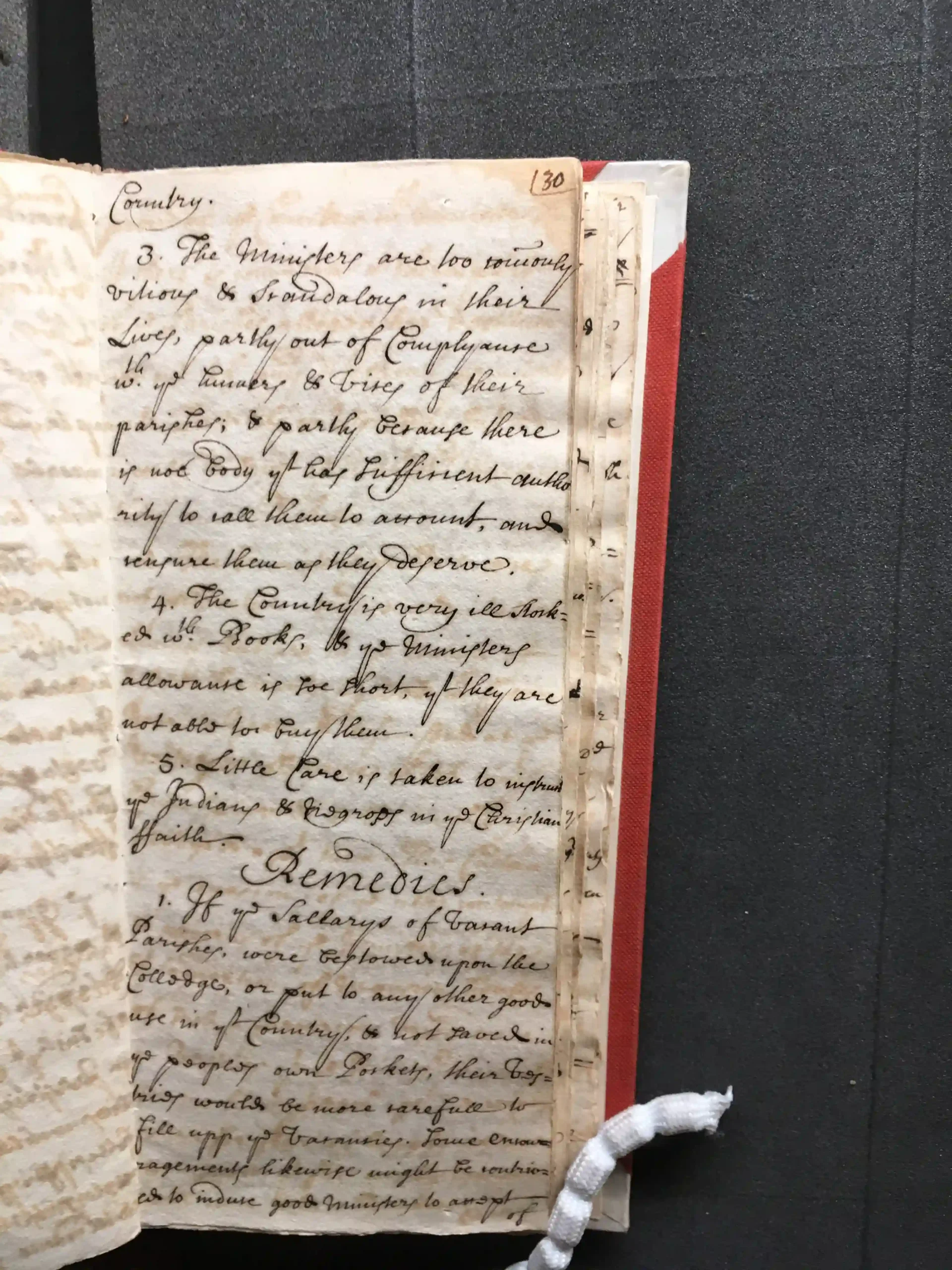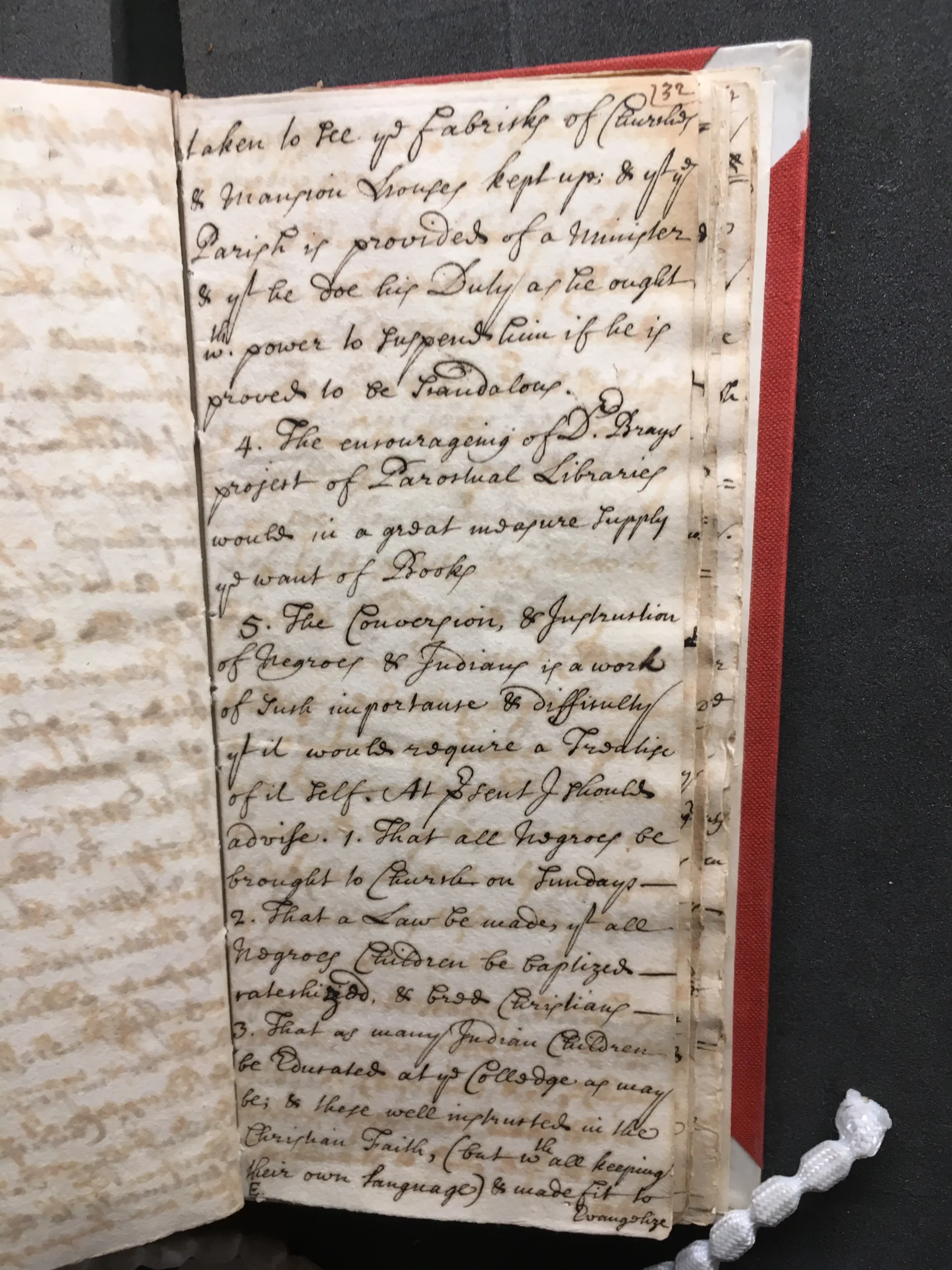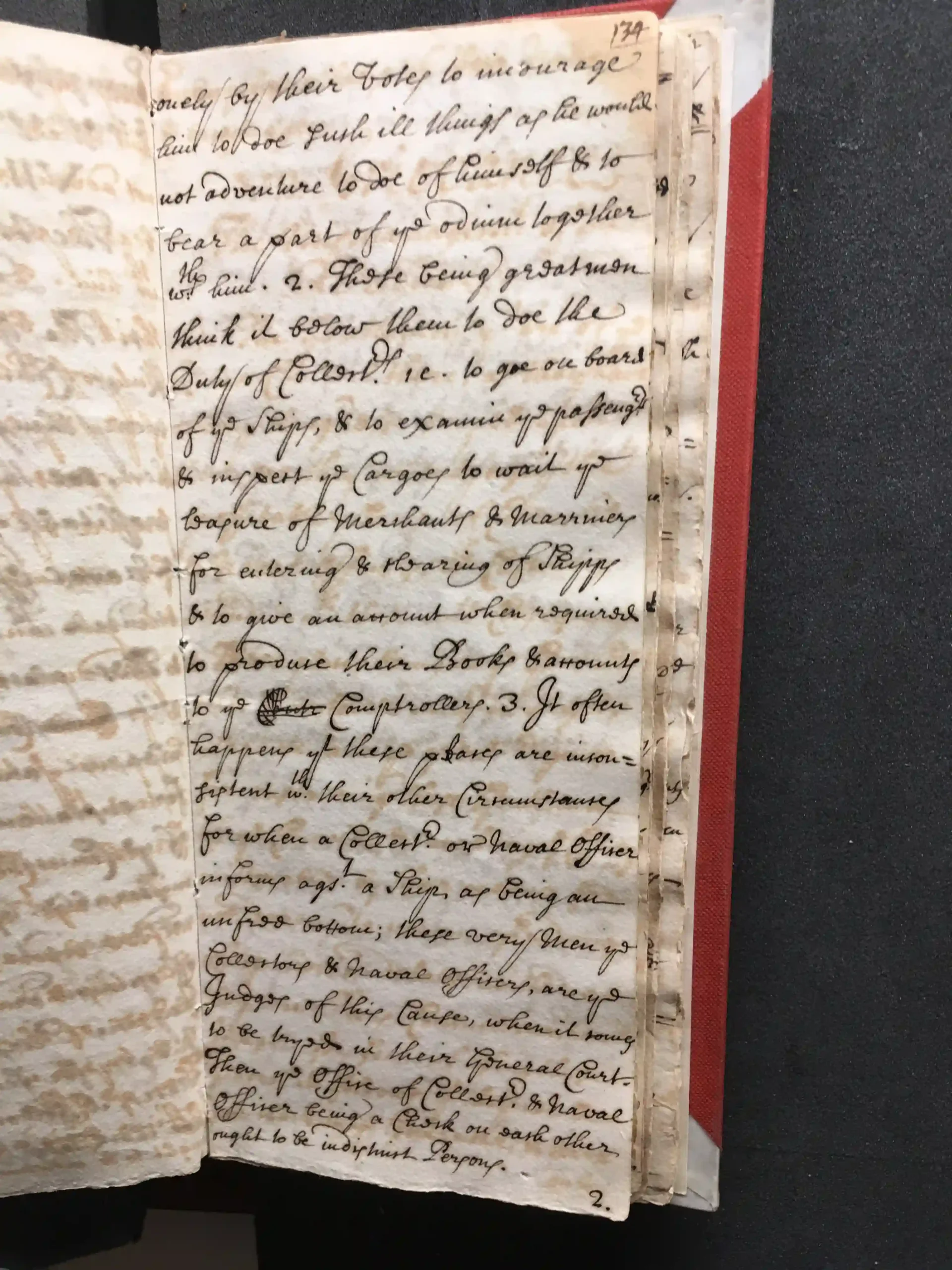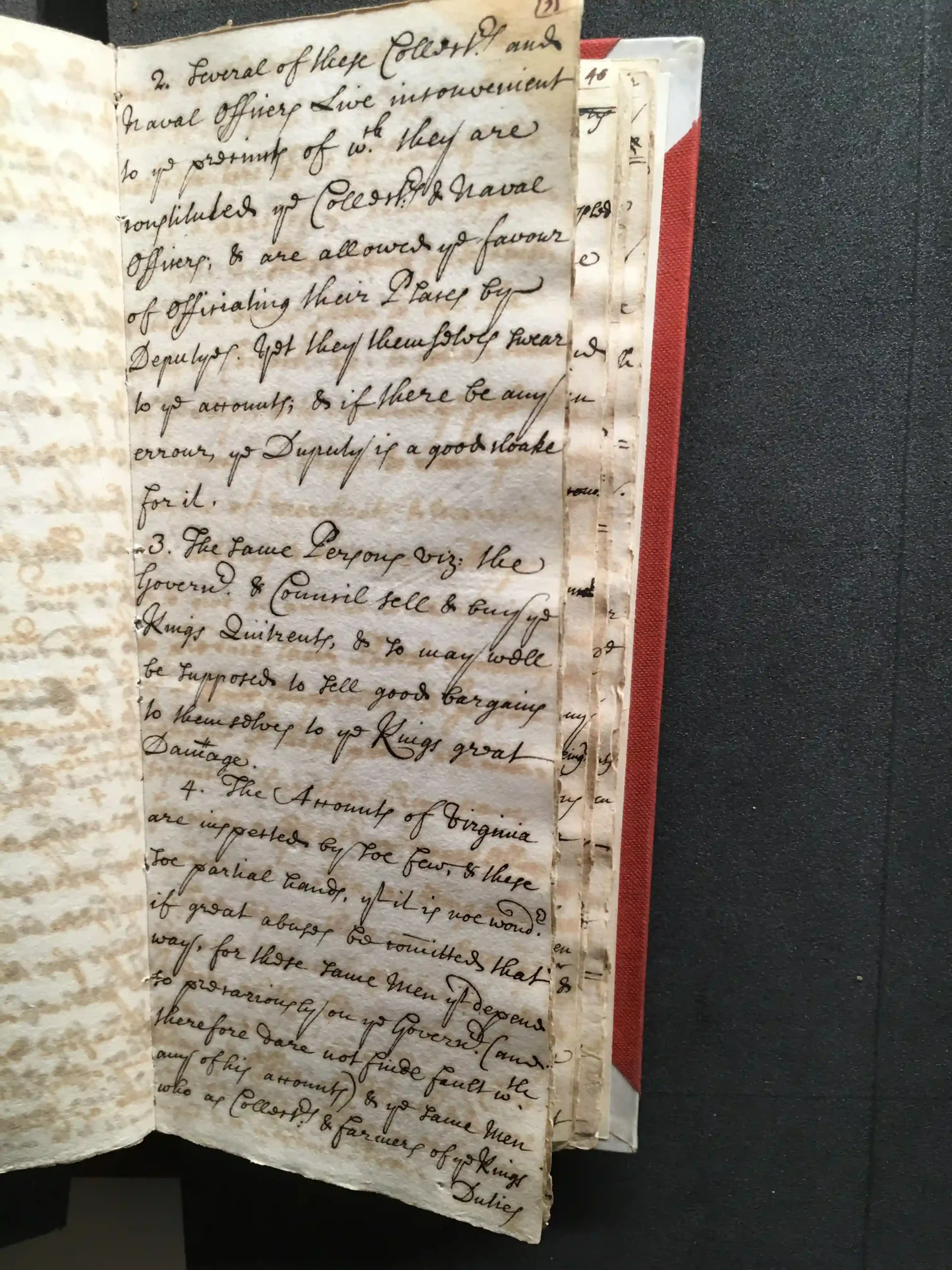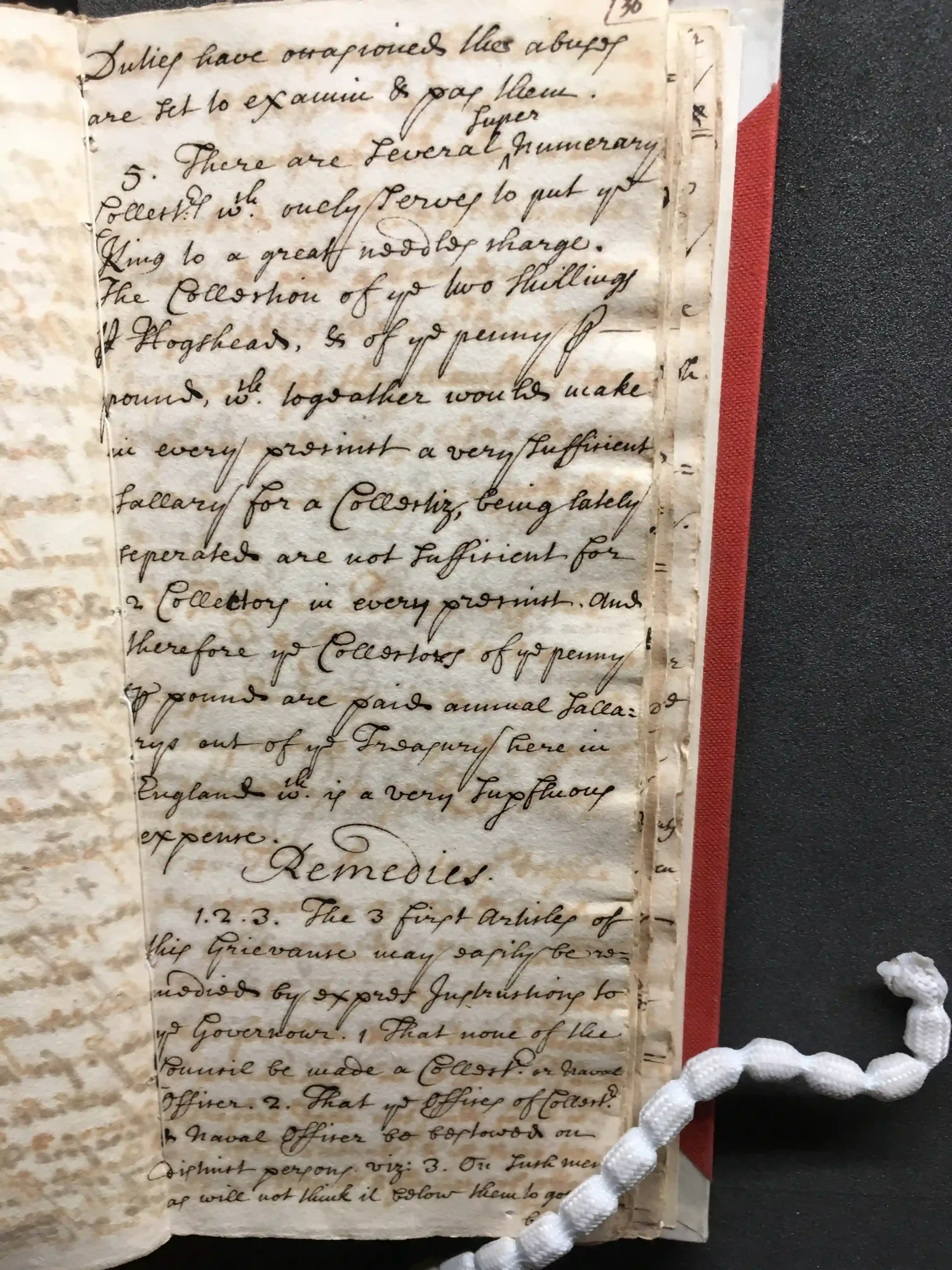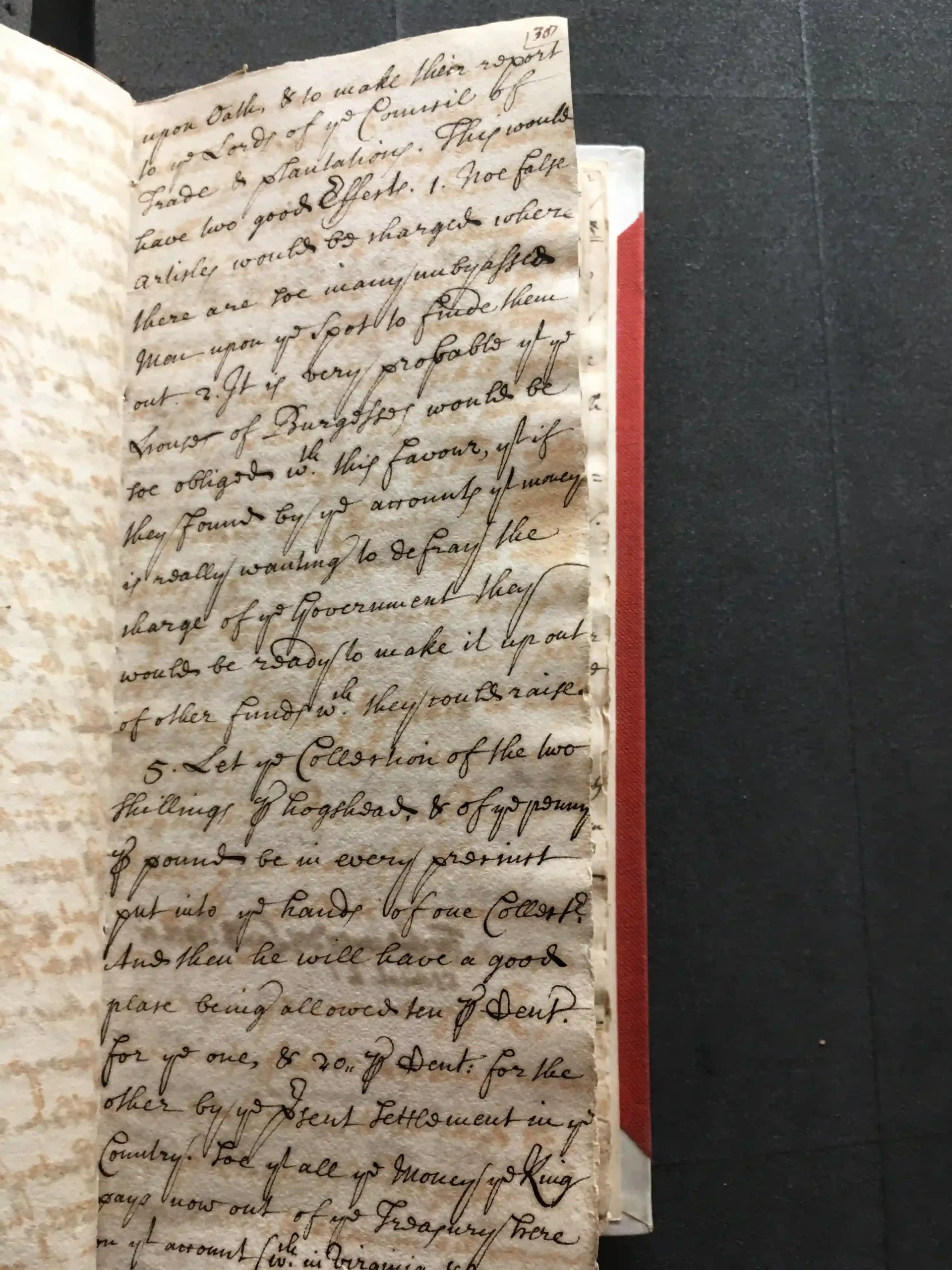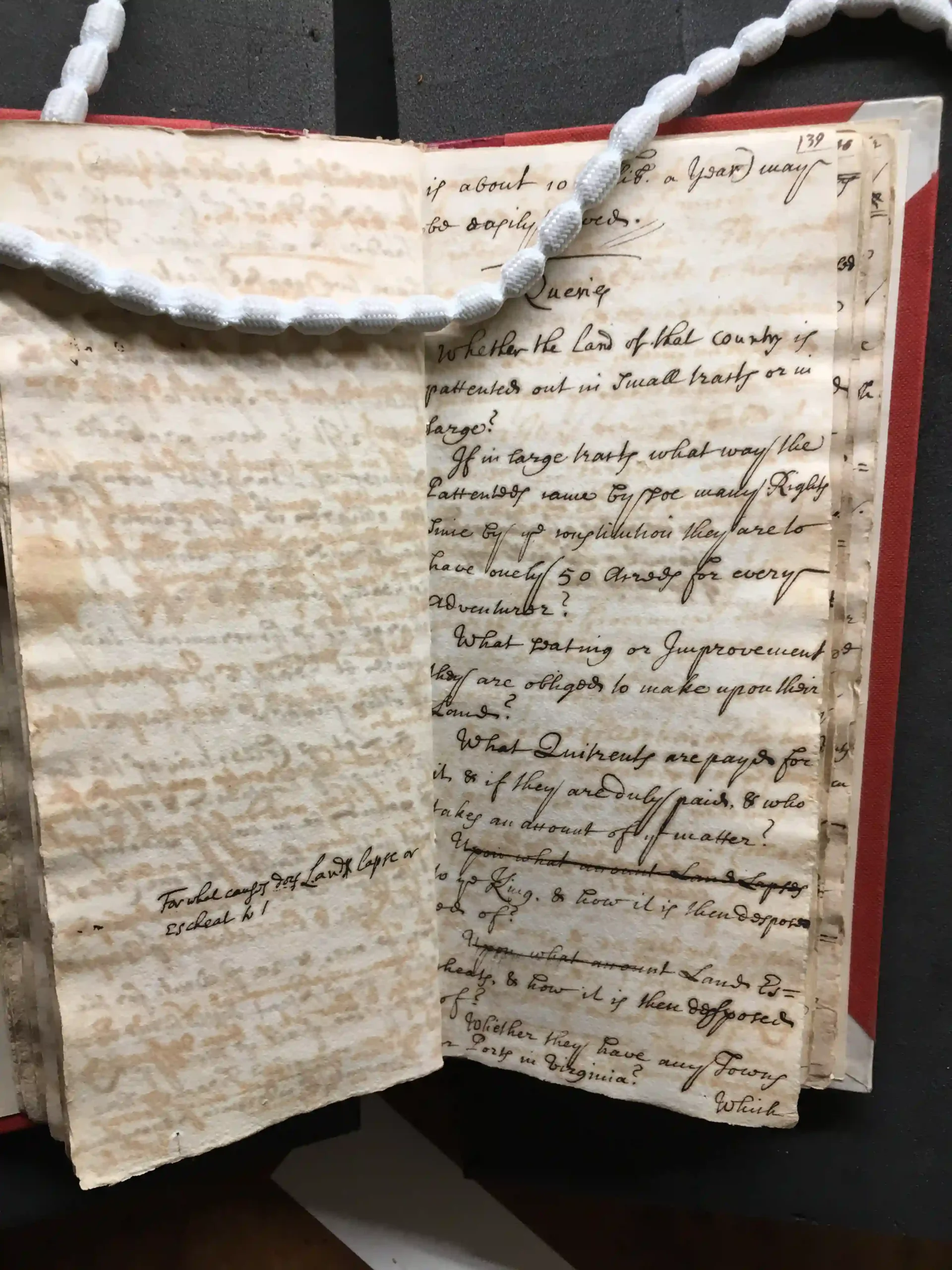London
Locke’s 1698 Virginia Plan
As a leading member of the Board of Trade after the Glorious Revolution in 1688, John Locke investigated and wrote a lengthy plan to reform Virginia laws and policies, including polices of governance and that related to slavery.
Introduction
After the Glorious Revolution and the publication of his Two Treatises of Government as well as his other major treatises, especially his Essay Concerning Human Understanding (1690), which justified those revolutions, Locke became very well known. Even though he refused, even on his deathbed, to publicly acknowledge authorship, it was widely acknowledged by many that he was the author.
As a consequence, when William III turned to reforming colonial governance in 1696, he appointed John Locke to a newly reorganized “Board of Trade” which was supposed to review all colonial laws and suggest reforms. William III also appointed Locke because of strong pressure from the radical “Whig Junto” that then controlled Parliament, led by Sir John Somers. They threatened to wrest control of the colonies away from King William if he did not make efforts to reform them.
Virginia was of great interest to Locke and the board, partly because it was the first colony, but also because it was one of the largest and most profitable colony for the crown (given that tobacco tax revenues collected in England were very high, even compared to sugar). Locke, along with other reforming members of the board, led a two-year investigation into Virginia on a wide range of topics, which involved a great deal of correspondence as well as close questioning of Virginians in London.
At the end of that time, Locke composed this Virginia Plan, which provided the basis for new royal instructions for a new Governor of Virginia, Francis Nicholson, in 1699. Locke was very critical of the former Governor of Virginia, Edmund Andros. Andros had been a favorite of James II’s, and Governor of the Dominion of New England from 1685-1689 before King William and Queen Mary transferred him to Virginia in 1693.
The following Virginia Plan was found rolled up in Locke’s desk when the Bodleian library acquired his papers after WWII, but scholars did not at first realize that Locke wrote it. It is a fascinating example of how the abstract debates about power translated into practical changes after the Glorious Revolution. In particular, pay attention to Locke’s observations and remedies related to the headright system, and consider how that perverted the distribution of power and contributed to the organization of governance and society. Even with a new Governor in place, it was difficult to change everything in Virginia from above: Locke in particular did not wish to overrule the legislature. Why?
The plan grew out of deep investigation into corruption in Virginia, and included recommendations that Locke would proceed to try to implement as instructions to the new Royal Governor Nicholson, in 1699. This document is particularly interesting because it represents a concrete set of proposals by which Locke tried to enact some of the principles of his Two Treatises.
One of the recommendations, to get rid of the bounty to masters for importing servants (including “negro servants”) led to a Virginia court decision by which Nicholson reversed the policy of granting a reward of 50 acres of land to masters who bought slaves, a reward that had originated in repeated monarchical proclamations, dating most recently to one by Charles II in 1682. It thus in some respects challenged slavery. The plan also sought reforms to limit the power of appointed officials in Virginia, to increase the power of elected assemblies, and to limit corrupt justice (among many other things). After William III died in a hunting accident in 1702, many of these changes were reversed under Queen Anne.
Holly Brewer
Rachael Edmonston
Lauren Michalak
Further Reading
- Holly Brewer; Slavery, Sovereignty, and “Inheritable Blood”: Reconsidering John Locke and the Origins of American Slavery, The American Historical Review, Volume 122, Issue 4, 1 October 2017, Pages 1038–1078, https://doi.org/10.1093/ahr/122.4.1038
- Kammen, Michael G. “Virginia at the Close of the Seventeenth Century: An Appraisal by James Blair and John Locke.” The Virginia Magazine of History and Biography 74, no. 2 (1966): 141-69. http://www.jstor.org/stable/4247202.
- Ashcraft, Richard. “Political theory and political reform : John Locke’s Essay on Virginia” Western political quarterly. 22 (1969):742-758.
Sources
- MS Locke e.9, ff. 1-39, Lovelace Collection, Bodleian Library, Oxford
- Transcription by Holly Brewer, Hannah Nolan, Michael Becker, and Dylan Bails
Cite this page
“Locke’s 1698 Virginia Plan,” ed. Holly Brewer, Rachel Edmonston, and Lauren Michalak. Slavery Law & Power in Early America and the British Empire – Accessed 27th February 2026. https://slaverylawpower.org/nhprc-sample-documents/lockes-1698-virginia-plan/
[Original Source: MS Locke e.9, ff. 1-39, Lovelace Collection, Bodleian Library, Oxford].
Content Warning
Some of the works in this project contain racist and offensive language and descriptions that may be difficult or disturbing to read. Please take care when reading these materials, and see our Ethics Statement and About page.
[1]
[Editor’s Note: The top half of the first page of this document, and also pages 39-43 below, are in John Locke’s handwriting. The bottomof p. 1 to the top of p. 39 are in someone else’s handwriting (an amenuensis) and also pages 43–68, which are the answers to the Queries Locke posed on pages 39-43.]
Some of the Cheif
Greivances
of the present Constitution of
Virginia
with an Essay towards the
Remedies therof
1. Greivance
The country ill peopled
Supposeing the evil consequences hereof are
in great measure apparent. I shall pass them
lightly over. Only in a word for
want of people.
1. The Country cannot defend itself
against an Enemy.
2. So much less Tobacco is made, &
consequently somuch less Shipping em-
ployed; soemuch less English goods rended
& soemuch less Custom paid to the Crown
of Englande.
3. Many other usefull Improvements
for the Kingdom of England are neg-
lected, which if that country were well
peopled; might be made among the
English; & for which a great deal of Money
is now yearly exported out of this Nation
[2]
such as 1. The Manufacture of
Iron, & all other Mynerals with which
the Country abounds. 2. The manu-
factures of Silks, for which it is very
proper, by reason of the plenty &
good thriving of Mulberry trees,
which is the food for Silk Worms. 3. The
Manufacture of Pot-ash for
Soap for which it is well fitted by rea-
son of the infinite number of trees.
4. The Manufacture of Pitch, Tarr,
masts & all Tymbers for Shipping.
5. The Manufacture of Wheat,
Ryce, Indian Corn, & all sorts of
grain, very usefull for the Supply
of our other English plantations.
6. The manufacture of Syder, Wine,
Oyle: Distilled Spirits, figs, raisons,
conserved fruits, for all which that Country
has great advantages. 7. The manu-
factures of Flax, hemp, & Cotton which
grow there very fine. 8. The manu-
facture of Salted Sturgeon, & seve-
ral other sorts of Fish, which are in
their Rivers [great plenty. 9. A great] *part between brackets cut off in photo
[3]
Indian Trade for Skins, & furres,
if it were reduced into Rules under
a Company. 10. A Trade for dyeing
Woods, and Curious Simples. With many
other Improvements which I know not,
nor can readily remember; for the
makeing of which the Country wants
ten times the Number of people they
now have.
The Causes of this want of
people are.
1. The ancient Encouragement
of 50 Acres of Land per poll de-
signed & ordered by the King upon
the first seating of the Country, for all
that should come and settle there, has
been strangly perverted, & frustrated.
1. by granting the 50 Acres of every
Servant to his Master that buys him.
2. by granting 50 Acres to every
Seaman, & that for every time he ad-
ventures himself into the Country, tho’
he Never stays, nor settles there.
3. By yet a greater and constant abuse
at the Secretaries Office, where the
[4]
Clerks sell to any Man Rights for
as much Land as he pleases at the
rate of five shillings, or less for
every right, that is every 50 acres.
By this trick the great men of the
Country have 20, 25, or 30 thousand
acres of Land in their hands, &
there is hardly any left for the
poor People to take upp, except
they will goe beyond the inhabitants
much higher up then the Rivers are
navigable, & out of the way of all
business.
2. No Care was taken in the begin-
ning to seat that Country in Townshipps
as in New England &c. By which means
they are deprived of the great Com-
pany of Citizens & Tradesmen that are
in other Countrys.
3. Whereas other Proprietors
have taken great Care in England
to procure Adventurers into their
several Countrys, by giveing a good
Character & Discription of them
in Books & Maps, by constituting
their Agents to lay out for such Tradesmen
[5]
as want business; by advanceing
Money to defray the Charge of
their passage; & by helping them
to convenient means of Subsistance
when they are arrived in their
several Proprietorships, till they
got into a way of Settlement: On
the Contrary none of all these helps
are afforded to Virginia; but it
passes under a cursed bad Character
& poor people that have a Minde
to goe thither haveing none of these
assistances must become Servants
for 4 or 5 Years to pay for their
passage. And it seems to be a bad
step that forraigners (who ought more
to be encouraged to come & seat
there than the English themselves)
are by a late Act of Parliament
discouraged, by being made incapable
to hold any Office of Triest in
the Courts of Law or Treasury. There
are two reasons why I say forraigners
should be more encouraged to remove
into the Plantations, than the English them
[6]
One is to keep these forraigners
from the thoughts & design of make-
ing Plantations, & Colonyes of their
own, independent on the Crown
of England; & the other is that by
every forraigner that Settles in the
English Plantations, the King
gains a new Subject without any
loss whereas by every Englishe
Man settling there he gains indeed
a new Subject to the plantations
but losses an old Subject for him
in England.
4. Noe doubt the Lordship of
the Government & constitution of
Virginia (which will appear in the
particulars hereafter mentioned)
hinders Several Men of Sense
& Estate from adventureing them-
selves & families into it or continu-
ing in it.
5. Governers are sent over
thither not such as are to stay &
Live with the people, but such as are
to make a little Money for 4. or 5.
years, & then to return again. Now
[7]
it is not likely that men goeing with
this design will promote Towns
or any other Improvements, but
such as will quit cost, & pay them
for their pains, in their own time.
Remedies
These evils have been of soe
long standing, & are soe deeply
rooted, that it will be a very hard
matter to contrive any remedy
for them. But something I shall
offer, & with all humility submit
it to more Mature consideration,
suiting the Remedies in correspon-
dent Numbers to the proceeding caus-
es of the Grievance.
I. For the Encouragement of Land
it must be confessed, that that is almost
utterly & irrecoverably lost, the good
Land being all almost already
taken up. But to mend the matter:
1°. Let the King Strictly prohibit
all these coures for the future.
And let noe Land be bestowed (of
that which is now in his Majestie’s grant) but
upon the Adventurers that Settle in the Country
[8]
and not to be claimed but by them-
selves when they are free. Let this
Rule be observed as well as to Lapsed
Land as to Land that was never
taken up;
2°. Let a Strict enquiry be made
into the great Tracts possessed
already, & care taken, that the owners
of them doe duly pay their Quitrents
with all the Arrears from the Date of
their several Pattents, without any
compounding. And in case of Re-
fusal, let Lybertye be used allowed
to these owners to surrender the said
Tracts of Land into the Kings hands
again; which several of them would
doe rather than pay the utmost pen-
ny of Quitrents. And when they
are in the Kings hands, let them be
disposed of according to the former
method of Land never taken upp
or Lapsed.
3°. I think there is an old Law in
being as to frontier plantations, that they
shall be seated with four able hands (but
this Law is not observed in practise) Let this
practise
[9]
practise be revived, & if any will
not comply with it, the Land will be
Lapse to the King, & may be dispos-
sed to the Adventurers as above.
4°. Let endeavours be made used to
get a new Law passed in the
General Assembly of Virginia to
oblige all that have already taken
up Land to make a plantation
within 3 years upon every 500 Acres
of it.
II. The defect of Townes may
yet be supplyed tho’ with more diffi-
culty than in the beginning.
1°. If his Majesty would appoint
certain Ports, where Shipps shall
ride, & all Goods be entered whi-
ther exported or imported: which by
the by would mightily improve this
Customs.
2°. If the Privileges of weekly
mercats, & some few fairs in a Year
(with such other privileges as used
to be granted to Corporations) were
granted to the Inhabitants of these places
[10]
3°. If Tradesmen imported might
be set free, upon Condition that they
follow their Trades in some of these
townes. The fund for doeing this
might either be raised by the Country
(as the groat a Gallon on Liquors)
or at least be lent to these Trades
men, who would be glad to repay
it after they should come to earn
the money by their Trade, rather
than Serve 4. or 5 years as the Custome
now is.
4°. It would be well if the King
would order the Governour, & other
principal officers of the Government
to reside at the chief of these Towns
viz: the Secretary, the Auditor, the
Judges, (when they come to be ap-
pointed) the Atturney General, the
Clerk of the Council, the Clerk of the
General Court, the Clerk of the County
Court, the Collector & naval Officer
of that Port, & to keep their several
offices there, as also that the General
Assembly should sit there; & if this
were
[11]
were the same place where the
Colledge is (which for health & all
other Conveniences is the fittest
place in the Country for such a
Town). this would make one good
Town at once.
5°. To Advance the Trade &
consequently the people of these
Towns, it will be necessary to
encourage Money dealings & theremportation of Money, & to ascer-
tain the values of it by some
equal Standart, which shall be com-
mon to all the English plantations.
III. To Encourage people
to Transport themselves thither.
1°. Let a little Book be written
giveing a good description & large
Mapp of Virginia; wherein with
a great dale of truth it may be
proferred for all the Naturall
Advantages of a Country to the best
Proprietorship of ‘em all. And
if the Government will supply what it
wants of improved advantages, it
may
[12]
may then truly be represented as
one of the best Countrys in the world.
2°. Let such Agents be imploy’d
to look out for Tradesmen that want
busines here, as are for the Proprie-
torships, to direct & assist them in
their passage to Virginia. And let
those Tradesmen be set free at their
first comeing over, & setting up
in a Town as above.
3°. It might be worth the while
to Consider whither multitudes
of poor people that are onely a
burthen to their parishes at home
here in England might not be
well spared; as also whither
several Delinquents had not
better be sent to the Plantations
(tho’ condemned to several Years
Servitude) than to be sent to
Tyburne: as also whither it might
not be fit to transport some of the
Native Irish or the poor French
Protestants, who might all Live
comfortably there, & have land at an
easie
[13]
easie rate.
4°. As people of different
pswasions enjoy Lybertie of
Conscience, so let people of all
Nations be Naturalized, & en-
joy equal priviledges, with the
other English inhabitants residing
there.
IV. It may be hoped that the
hardships occasioned by the bad-
ness & arbitrarines of the Consti-
tution (hereafter to be mentioned)
will be remedied at leasure
much as they are in any propri-
etorship or other English planta-
tion. And if there be any differ-
ence in this respect it is but
reasonable the advantage should
be on the side of Virginia, the
King haveing noe Subjects what-
soever that bring in soemuch to
the Treasury proportionably to their
Number as those of Virginia doe.
V. It is to be wished that in the
choice
[14]
choise of a Governour the princi-
pal consideration were, that he be
a Man of a Generous publick
Spirit, & not some poor noble
Man, or great Gentleman of
a broken fortune, or if Men of
publick Spirits cannot be found
he might be induced with the hopes
of some reward to build towns.
II. Grievance
The Arbitrarines of the
Government.
The Government is in the hands
of a Governour, & twelve men
that are called the Council who (I
suppose) were designed at first
for a check to? to him, but by some
particular powers conferred
on the Governour, it is easy for
him to manage the Councill
that humanely speaking, it is never
to be expected that they will give
their opinions freely in any matter
but onely soe as to please him &
serve
[15]
serve his interests. For he has the
conferring of all places of prof-
fit belonging to the Government
& it is now such a constant
practise to bestow them upon
the Gentlemen of this Councill
that if any of these places falls
for the Officiating whereof there
is none of the Council Lives con-
venient, yet it is always bestow-
ed on one of the Council, & he is
allowed to officiate it by a Deputy.
Then upon the least dissatisfaction
the Governour cannot onely turn
them out of all these places but
also suspend them from the Coun-
cil it Self at his pleasure; from
which it follows that all the power lodged
in him & them […]is really
& in effect lodged in him alone;
& that they depending soe precarious-
ly upon him it cannot in any
reason be expected that they will
be a check to him; So that those
[16]
of his Council is only to bear a
share of the odium, & to give him
courage to doe these things which
he would never venture upon, if
he had the Government solely Lodged
in himself without any Council. Nor
is there any relief to be had any
where in that Country against the op-
pressions of a Governour, & Council;
for if any should think of relief
by Law, this is utterly in vain,
for the same Governour, & Council
are the Judges at Common Law,
Chancery, Exchequer, Admiralty in all
causes not excepting even Cri-
minal & Spiritual Causes, & noe
appeal lies from them but to the
King in England & that onely in
such cases where the cause shall
be judged by them to exceed 300£
value. Besides the Council sets
in soe many other, & some of ‘em
so inconsistent capacities as are
enough to enable them both to
cheat the King & oppress the Country;
[17]
for besides what is already men-
tioned viz: their being.
1°. The Administrators of the
Government & Council of State.
2°. The Judges in all causes,
they are likewise
3°. The house of Peers
4°. The Comissioners of the King’s
Customs which they sell to one an-
other.
[5th omitted]
6°. The Collectors of all publick
Duties.
7°. Naval Officers, which two
last should be a Check upon each
other.
8°. Secretary Treasurer and
Escheatours.
9°. The Lords Lieutenants
of the Several Counties.
And which ruins all, they are
all this onely Dureing the Go-
vernours pleasure. So that in
all these great trusts they are
under the greatest awe & re-
straint; & if the Governour happens
to
[18]
to be an il man (as uncontroul-
ed power is apt to corrupt him)
then the whole frame of Government
is quite out of order; & there
is noe other prudent restraint
to keep things right.
Remedies.
1°. Let great care be taken in
the choise of the men that shall be
named to be of this Council, that
the Lords of the Council for Trade
& plantations have their Charac-
ters from the best hands. The
best constant Rule I can think
of in this matter, is that the Generall
Assembly, especially the house
of Burgesses be appointed from
time to time to transmit a List of
such men as they judge to have
the best reputation, & the fittest
to be recommended to be of the
Council.
2°. Let the Gentlemen who shall
be named to be of the Council hold
their places (not dureing the Governours
but)
[19]
but) dureing the Kings pleasure.
And let it not be via the Governours
power to Suspend them, but onely
to give his & the Councils advice
concerning their Suspension to the
Lords of the Council for Trade
& Plantations, & that after an ac-
cusation of some mal-adminis-
tration alledged & proved against
them. And let the who process in
writing be transmitted to the Said
Lords, who may pass such judg-
ment upon it as they shall
think most proper.
3°. It is a thing of very evill
consequence that the Council should
out in soe many, & some of ‘em
soe inconsistent capacities. I
should advise (because I would
not alter the Constitution it self only
remove the abuses of it) that they
may be the house of Peers, &
the Council of State, & the Lords
Lieutennants of the Counties. Nor
doe I see any great inconvenience
if
[20]
if the Secretary & Auditor be
chosen out of their Number, pro-
vided they be named by the King
& hold their places independant
of the Governour; & if they were
recommended by the Generall
Assembly it would be soemuch
the better. But for the other
places belonging to the Justice, &
the Revenue which are now in the
hands of the Council, these want
great Regulations which I shall not
mention in this place to avoid
repetitions, for they will come
better in by & by under the follow-
ing Grievances, about the Justice
& the Revenue.
III. Grievance:
Concerning the Administra-
tion of Justice.
It is a great Grievance that
this weighty matter is in the hands
of the Governour, & Council; Men
utterly ignorant of the Law, impa-
tient of contradiction apt to threaten
threaten
[21]
threaten Lawyers & parties with
imprisonment, if they use freedom
of Speech, men that cannot be called
to account for acts of injustice,
Men that take noe Oath to doe Justice
Men that have made an order that they
themselves shall not be arrested, &
Men that are under strong temptations
to a bypass in giveing their opinion
by reason of the places of proffit
they hold dureing the Governours
pleasure, who is always there & by
his great power, can easily run
down the barr, & sway the bench, &
direct the Judgement what way he
pleases.
Remedies
The best Remedy would be, if
this whole business of Judging, for
which the Governour & Council are
utterly unqualified, were taken
out of their hands & comitted to a
Chief Justice, & any two men more
well Skilled in the Law. But if
this cannot be obteined. Let at least
the Governour himself be forbid sitting in
Judgement
[22]
Judgement. Let the Council hold
noe places dureing his pleasure, but
dureing the Kings. Let them all take
the Oath of Judge according to Law.
And let that base order be abolished
which exempts them from Arrests, that they
may be Subject to the sameLaws with other
Men.
IV. Grievance
Concerning the Management
of the Council.
1. The precarious way by which the
Gentlemen of the Council hold their
places of proffit, onely by the
Governours gift & Dureing his plea-
sure, & the power he has to suspend
any of them from sitting in Council
as an effectual way to hinder all
freedom of Councils or debates there.
For with out of hope of getting, & fear
of looseing a place, they all endeavour
to out strip one another in ready
compliances, & flatteries, & give
their advice noe further, for the King’s
or Countrys Service then the Governour
is pleased to permit & dictate.
2
[23]
2. As the Governour can thus get any
thing voted in Council he has a
minde to; soe when the vote is once
passed they give themselves noe
trouble to see the wording of it; but
leave that matter intirely to the
Clerk who writes whatsoever
the Governour is pleased to order &
dictat. And those orders so clan-
destinely drawn, are never afterwards
soe much as read in Council
3. The Governour keeps the Council
soe much in the dark, that he conceals
his Instructions from them, & com-
municates them by piese meal, now
& there one, as he finds it may
make for his Interest. Whereas the
exact understanding of the whole
purport of the Governours Instructions
seems to be the most essential Ac-
complishment of a good Councellor.
4. In short the whole Government
is soe administered as if the Governour
represented the King, & for his own
satisfaction & security took advise
of his Council; but after all might chuse
or
[24]
or refuse their Council as he thinks
fit.
Remedies
1. The places of proffit bestowed
on the Council, (viz: Collectors, Naval
Officers, farmers of the Quitrents)
might here bestowed to be very
hurtfull to the King & Country’s Service.
But it will fall in better hereafter
when I speak of the Revenue.
What is farther hurtfull in this
first Article might be remedied if
all the Council were named by the
King, not by the Governour, & held
their places dureing the Kings, not
dureing the Governours pleasure, &
if a List of Candidates for the
Council were given in, not by the
Governour alone, as now is, but by
the whole General Assembly, out
of whom, or any others, the King
thinks fit, he might name for
his Council whom he pleases. And
let the Suspensions of the Councill
as above p. 11 .
2. The Governour’s Instructions ought
to lye before the Council, as being the Ground
of
[25]
of all their advises. The orders
of Council ought not onely to be voted
but also worded & entered to their
satisfaction. And the Governour
should be oblieged to follow, as
well as to ask their advise, & the
Constitution such that it may be un-
derstood, that the Council has a share
in the Government. Perhaps it
may be fit to give the Governour
a negative voice & noe more.
V. Grievance:
Concerning the Generall
Assembly.
1. Often when a Governour is not
well with the Country for many
Years together, he calls noe Gene-
ral Assembly; soe that not onely
the Countrys Grievances are not
redressed, but the King is kept
ignorant of the true State of the Country all the
while.
2. If the Country & the House of
Burgesses, who represent them
have never soe many Grievances
then
[26]
they have noe way to represent
them at the Court of England nor
to Sollicit the redress of them without
the concurrence of the Governour &
Council. And it is not to be ex-
pected that they will concurr being
most commonly the occasions of these
Grievances themselves. For noe
business can be done in England
without Money, & noe Money can
be raised with but by the joint con-
currence of the whole Generall
Assembly, i.e., Governour, Council,
& Burgesses.
3. The Governour who has one
Negative Vote of himself in passing
their Laws, yet sits commonly with
the Council, while the Laws are
under Consideration among them
& directs & overules their Councils.
4. If the Assembly raises any
money for the necessary occasions
of the King or Country, the Governour
will not suffer them to name any
Collectors or Treasurers of it, but
will oblige them to take a Treasurer
of his Nomination, & it must be all issued
[27]
it by warrants from himself. The
Standing on this point raises great
jealosies that he has a minde to
finger the money, & doth often
hinder the raising of Money upon
very necessary occasions.
Remedies
1. It would be a good Constituti-
on, if the Governour had in his In-
structions to call an Assembly
once a Year. For there is noe
way to keep up a good understand-
ing with the Country, or to Know the
true State of the Country, or to try
the fitnes of a Governour, to manage
the people like that of frequent
Assemblys.
2. It seems very necessary that the
way should be made easy for the
House of Burgesses to represent
their Grievances to the King or
to the Lords of the Committee for Trade
& Plantations. And therefore that
the said house may have Lybertie
not only to make addresses to the
Government
[28]
Government but also to raise money
upon the Country for defraying the
Charge of presenting & solliciting
the same.
3. The Governour ought not to
sit with the Council, when the Laws
are under Consideration, but to leave
them to the freedome of their own
Consultations, & debates, as the
King does the House of Lords.
4. Soe that noe money be raised
but according to Law. I see noe
harme in gratifying the Assembly
with the nomination of their own
Collectors & Receivers. It is certain
that they will give much more freely
for the service of the King & Country
if they have leave to nominate
these Officers, & can oblige them to
part with none of the said money, but
for the true use for which it was raised.
VI. Grievance:
Concerning the Clergy & Religion.
1. There is soe little care taken to
provide
[29]
provide the Country with Ministers,
that there is commonly a third part
of the Parishes altogeather destitute
not out of any different principles
as to Doctrine or Worship; but
meerly to save the Ministers dues in
their own Pockets.
2. The Ministers we have, are
not presented nor induced into their
Livings but are in the Nature of
hyred Servants agreed with from
Year to Year, & dismissed at the
Vestryes pleasure, without any
Crime proved or soe much as
alledged against them. This Custome
is the occasion of the utter contempt
& poverty of the Ministers, of the
dilapidation of Mansion houses,
of such a precarious dependence
on Vestries that the Ministers dare not
soe much as preach against the reigning
vices, for fear of being turned out
& in short that few worthy Ministers
will come into, or Continue in the
Country
[30]
Country.
3. The Ministers are too commonly
vitious & Scandalous in their
Lives, partly out of Complyance
with the humers & vices of their
parishes; & partly because there
is noe body that has Sufficient autho-
rity to call them to account, and
censure them as they deserve.
4. The Country is very ill Stock-
ed with Books, & the Ministers
allowance is soe short, that they are
not able to buy them.
5. Little Care is taken to instruct
the Indians & Negroes in the Christian
Faith.
Remedies.
1. If the Sallarys of Vacant
Parishes, were bestowed upon the
Colledge, or put to any other good
use in that Country, & not saved in
the peoples own Pockets, their Ves-
tries would be more carefull to
fill upp the Vacancies. Some encou-
ragements likewise might be contriv-
ed to induce good ministers to accept
of
[31]
of Missions into the plantations;
And the Colledge there if duly en-
couraged will Nurse up a Seminary
of Young Divines for that Country
who will have this to recommend
them beyond their present Ministers
that their Life & Conversation may
easily be known from their very
infancy.
2. Let the Ministers there be
presented & inducted as they are
in all other Protestant Churches.
And if the Vestry neglect to present,
let the power of presentation for that
time devolve to the Ordinary. Only
it may be very reasonable to give
the vestries at least a Years tryall
of a Minster, before they be ob-
liged to present him.
3. It is necessary that some Clergy
man be impowered to make visi-
tation of Churches; & that the Church
wardens upon Oath make their
presentments to him; & that care be
taken
[32]
taken to See the fabricks of Churches
& Mansion houses kept up; & that the
Parish is provided of a Minister
& that he doe his Duty as he ought
with power to suspend him if he is
proved to be scandalous.
4. The encouraging of Dr. Brays
project of Parochial Libraries
would in a great measure supply
the want of Books
5. The Conversion, & Instruction
of Negroes & Indians is a work
of such importance & difficulty
that it would require a Treatise
of it self. At present I should
advise. 1. That all Negroes be
brought to Church on Sundays—
2. That a Law be made, that all
Negroes Children be baptized—
catechized, & bred Christians—
3. That as many Indian Children
be Educated at the Colledge as may
be; & these well instructed in the
Christian Faith, (but with all keeping
their own language) & made fit to
Evangelize
[33]
Evangelize others of their Nation
& language.
VII. Grievance
The Mismanagement of the
Revenue.
1. The Gentlemen that are of the
Kings Council there, as they have
every thing else heaped upon
them, soe they commonly enjoy the
proffitable places of Collectors
& Naval Officers, which Custom is
attended with these evil Consequences.
1. These places being in the Governour’s
gift, & bestowed onely dureing his
pleasure are the great Engines
for enslaveing these Gentlemen
of the Council, & makeing the Country
miserable by their means: for
not dareing to use any freedome
of opinion or debate, neither as
they are Peers, Councellour, nor
Judges, for fear of losing these
places, it follows that they can be
noe check to the Governour, & serve
only
[34]
onely by their Votes to incourage
him to doe such ill things as he would
not adventure to doe of himself & to
bear a part of the odium together
with him. 2. These being great men
think it below them to doe the
Duty of Collector, i.e., to goe on board
of the Ships, & to examine the passengers
& inspect the Cargoes to wait the
leasure of Merchants & Marriners
for entering & clearing of Shipps
& to give an account when required
to produce their Books & accounts
to the Cont Comptrollers. 3. It often
happens that these places are incon-
sistent with their other Circumstances
for when a Collector or Naval Officer
informs against a Ship, as being an
unfree bottom; these very Men the
Collectors & Naval Officers, are the
Judges of this Cause, when it comes
to be tryed in their General Court.
Then the Office of Collector & Naval
Officer being a Check on each other,
ought to be in distinct Persons.
2.
[35]
2. Several of these Collectors and
Naval Officers Live inconvenient
to the precincts of which they are
constituted the Collector & Naval
Officers; & are allowed the favour
of officiating their Places by
Deputyes. Yet they themselves swear
to the accounts, & if there be any
errour, the Deputy is a good cloake
for it.
3. The same Persons viz: the
Governour & Council sell & buy the
Kings Quitrents, & so may well
be supposed to sell good bargains
to themselves to the Kings great
Damage.
4. The Accounts of Virginia
are inspected by soe few, & these
soe partial hands, that it is noe wonder
if great abuses be committed that
way, for those same men that depend
so precariously on the Governour (and
therefore dare not finde fault with
any of his accounts) & the same Men
who as Collectors & farmers of the Kings
Duties
[36]
Duties have occasioned the abuses
are set to examin & pay them.
5. There are several super numerary
Collectors which onely serves to put the
King to a great needles charge.
The Collection of the two Shillings
per Hogshead, & of the penny per
pound, which togeather would make
in every precinct a very Sufficient
Sallary for a Collectiz, being lately
separated are not sufficient for
2 Collectors in every precinct. And
therefore the Collectors of the penny
per pound are paid annual Salla-
rys out of the Treasury here in
England which is a very Superfluous
expence.
Remedies.
1. 2. 3. The 3 first Articles of
this Grievance may easily be re-
medied by expres Instructions to
the Governour. 1. That none of the
Council be made a Collector or Naval
Officer. 2. That the Offices of Collector
& Naval Officer be bestowed on
distinct persons. viz: 3. On such men
as will not think it below them to goe on
board
[37]
board, & to examin Marriners—
Cockels, & Cargoes: & to wait at
their office for entering & clearing
of Shipps, & will be ready to ex-
hibit their Books & accounts as
often as thereunto required by the
Comptrollers. 4. That every Collec-
tor, & Naval Officer shall offici-
ate his place in his own person
& not by a Deputy. 5. That neither
the Governour nor Council, by them-
selves nor by others in their name
buy the Kings Quitrents, seeing
they are the Persons that must sell
buy them. But that the sale be made
by way of publick victory to any
responsible Person or Persons
that will give most for them.
4. It would be an excellent
way (to prevent all cheats and
abuses in the accounts of the Kings
revenue) if those accounts were
ordered Yearly, to be laid be-
fore the House of Burgesses, with
[power to them, to examine all persons]*missing in image
[38]
upon Oath, & to make their report
to the Lords of the Council of
Trade & plantations. This would
have two good Effects. 1. Noe false
articles would be charged where
there are soe many unbyassed
Men upon the Spot to finde them
out. 2. It is very probable that the
House of Burgesses would be
soe obliged with this favour, that if
they found by the accounts that money
is really wanting to defray the
charge of the Government they
would be ready to make it up out
of other funds which they could raise.
5. Let the Collection of the two
shillings per hogshead, & of the penny
per pound be in every precinct
put into the hands of one Collector.
And then he will have a good
place being allowed ten per Cent.
for the one, & 20 per Cent: for the
other by the present settlement in the
Country. Soe that all the Money the King
pays now out of the Treasury here
on that account (which in Virginia [and Maryland]*missing image
References
Collections
Tags
- Holly Brewer; Slavery, Sovereignty, and “Inheritable Blood”: Reconsidering John Locke and the Origins of American Slavery, The American Historical Review, Volume 122, Issue 4, 1 October 2017, Pages 1038–1078, https://doi.org/10.1093/ahr/122.4.1038
- Kammen, Michael G. “Virginia at the Close of the Seventeenth Century: An Appraisal by James Blair and John Locke.” The Virginia Magazine of History and Biography 74, no. 2 (1966): 141-69. http://www.jstor.org/stable/4247202.
- Ashcraft, Richard. “Political theory and political reform : John Locke’s Essay on Virginia” Western political quarterly. 22 (1969):742-758.
- MS Locke e.9, ff. 1-39, Lovelace Collection, Bodleian Library, Oxford
- Transcription by Holly Brewer, Hannah Nolan, Michael Becker, and Dylan Bails
Footnotes
- *missing image
